 06/01/2009 15:37 06/01/2009 15:37 |
|
| | | OFFLINE | | Post: 16.185 | Registrato il: 28/08/2005
| Utente Gold | |
|
HOMILY, SOLEMNITY OF THE EPIPHANY OF THE LORD
1/6/09
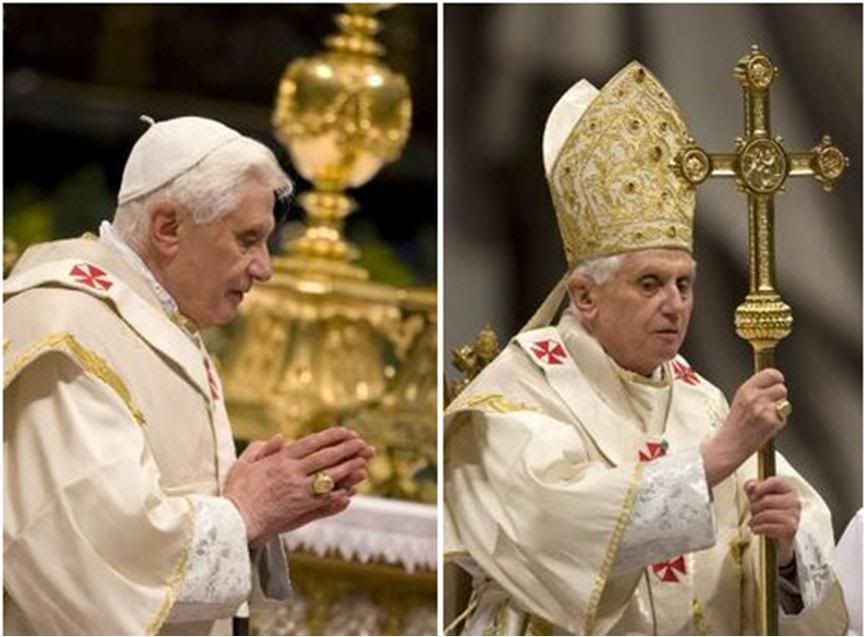 Here is a translation of the Holy Father's homily today:
Here is a translation of the Holy Father's homily today:
Dear brothers and sisters!
The Epiphany - the 'manifestation' of our Lord Jesus Christ - is a multiform mystery.
Latin tradition identifies it with the visit of the Magi to the baby Jesus in Bethlehem, and therefore interpreted it above all as the revelation of Israel's Messiah to pagan peoples.
Oriental tradition, instead, prefers to identify it with the baptism of Jesus on the river Jordan, when he manifested himself as the only-begotten Son of the heavenly Father, consecrated by the Holy Spirit.
But the Gospel of John asks us to consider even the marriage of Cana as an epiphany, when Jesus, changing water into wine, "revealed his glory, and his disciples began to believe in him" (Jn 2,11).
What should we say, dear brothers, especially we who are priests of the new Covenant, who are daily witnesses and ministers of the 'epiphany' of Jesus Christ in the Holy Eucharist?
In this most holy and most humble sacrament - which reveals and hides his glory at the same time - the Church celebrates all the mysteries of the Lord. "Adoro te devote, latens Deitas" – thus, in adoration, we pray along with St. Thomas Aquinas.
In this year, 2009, which is specially dedicated to astronomy, on the 4th centenary of Galileo Galilei's first observations on the telescope, we cannot fail to pay attention to the symbol of the star, so important in the Gospel account of the Magi (cfr Mt 2,1-12).
In all likelihood, they were astronomers. From their observatories, in the east relative to Palestine, probably in Mesopotamia, they noted the appearance of a new star, and interpreted this celestial phenomenon as the announcement of the birth of a new king, specifically, according to Sacred Scriptures, the king of the Jews (cfr Nm 24,17).
The Fathers of the Church ALSO saw in this singular episode narrated by St. Matthew a sort of cosmological 'revolution' caused by the entry into the world of the Son of God.
For example, St. John Chrysostom writes; "When the star came over the baby, it stopped, and this could be done only by a power that stars do not have: first, to hide itself, then to appear as a new star, and finally to stop" (Homily on the Gospel of Matthew, 7, 3).
St. Gregory Nazianzene states that the birth of Christ 'imposed new orbits on the stars' (cfr Poemi dogmatici, V, 53-64: PG 37, 428-429). Which is clearly to be understood in the symbolic and theological sense.
In effect, while pagan theology divinized the elements and the forces of the cosmos, the Christian faith, bringING Biblical revelation to fulfillment, contemplates one God, Creator and Lord of the entire universe.
It is divine love, incarnated in Christ, that is the fundamental and universal law of Creation. And this must be understood not in a poetic sense, but in a real sense.
That, too, was what Dante meant, when, in the sublime verse that concludes the Paradise section and the entire Divine Comedy, he defines God as "the love that moves the sun and other stars" (Paradise, XXIII, 145).
This means that the stars, the planets, the entire universe, are not governed by a blind force, they do not obey the dynamics of bare matter alone. Therefore, it is not the cosmic elements that must be divinized, but on the contrary, in everything and above everything, there is a personal will, the Spirit of God, which in Christ is revealed as Love (cfr Enc. Spe salvi, 2).
If this is so, then men - as St. Paul writes to the Colossians - are not slaves of the 'cosmic elements' (cfr Col 2,8), but are free, capable of relating themselves to the creative freedom of God.
God is at the origin of everything, and governs everything, not as a cold, anonymous motor, but as Father, Spouse, Friend, Brother, as Logos, 'Word-Reason', who has united himself to our mortal flesh once and for all time and fully shared our condition, manifesting the super-abundant power of his grace.
There is thus in Christianity a particular cosmological conception which found its highest expression in medieval philosophy and theology. Even in our time, this concept shows interesting signs of a new flowering, thanks to the passion and faith of not a few scientists who, in the footsteps of Galileo, renounce neither reason nor faith but value both to the utmost in their reciprocal fecundity.
Christian thought compares the cosmos to a 'book' - even Galileo said so - considering it as the work of an Author who expresses himself through the 'symphony' of Creation. Within this symphony, one finds, at a certain point, that which one would call in musical language a 'solo' [ assolo in Italian], a theme entrusted to one instrument or to one voice, which is so important that the significance of the entire work depends on it.
This 'assolo' is Jesus, to whom a regal sign corresponds: the appearance of a new star in the firmament. Jesus was compared by the early Christian authors to a new sun. According to present astrophysical knowledge, we should compare him to a star that is even more central, not only for our solar system, but for the entire known universe.
In this mysterious design, which is both physical and metaphysical, which led to the appearance of the human being as the crowning element of creation, Jesus came to the world: 'born of woman' (Gal 4,4), as St. Paul writes.
The Son of man assumes into himself heaven and earth, Creation and Creator, flesh and the Spirit. He is the center of the cosmos and of history, because in him are united without confusion the Author and his work.
The earthly Jesus was the peak of creation and history, but the risen Christ goes beyond: the passage, through death, to eternal life anticipates the 'recapitulation' of everything in Christ (cfr Eph 1,10).
Indeed, the Apostle writes, "all things were created through him and for him" (Col 1,16). And precisely through his resurrection from the dead, he became 'preeminent in all things" (Col, 1,18).
Jesus himself affirms this, appearing to his disciples after the resurrection: "All power in heaven and on earth has been given to me" (Mt 28,18).
This knowledge sustains the pilgrimage of the Church, Body of Christ, along the paths of history. There is no shadow, however dark, that can obscure the light of Christ.
That is why, for those who believe in Christ, hope never fades, even today, in the face of the great social and economic crises which afflict mankind; in the face of hatred and destructive violence which do not cease to cause bloodshed in many regions of the earth; in the face of the selfishness of man and his pretension of setting himself up as his own god, which can lead to dangerous distortion of the divine design of life and human dignity, of family and the harmony of creation.
Our efforts to free our life and the world from the poisons and contaminations that could destroy the present and the future have value and sense - as I noted in the aforementioned encyclical Spe salvi- even if we apparently are not succeeding or appear to be impotent against overwhelming hostile forces, because our great hope is "based upon God's promises that give us courage and direct our action in good times and bad" (No. 35).
The universal Lordship of Christ is exercised in a special way over the Church. "And he put all things beneath his feet and gave him as head over all things to the church, which is his body, the fullness of the one who fills all things in every way" (Eph 1,22-23).
Epiphany is the manifestation of the Lord, and by reflection, it is the manifestation of the Church, because the Body cannot be separated from the Head.
The first Reading today, taken from the so-called Third Isaiah, offers us the precise perspective for understanding the reality of the Church as a mystery of reflected light: "Rise up in splendor!", the prophet says, addressing Jerusalem, "Your light has come, the glory of the Lord shines upon you" (Is 60,1).
The Church is mankind enlightened, 'baptized' in the glory of God, that is, in his love, in his beauty, in his lordship. The Church knows that mankind itself, with its limitations and its miseries, brings to relief the work of the Holy Spirit.
She cannot boast of anything except her Lord: the light does not come from her, the glory is not hers. But her very joy that no one can take away is this: to be the 'sign and instrument' of him who is 'lumen gentium', light of the people (cfr Conc. Vat. II, Cost. dogm. Lumen gentium, 1).
Dear friends, in this Pauline Year, the Feast of the Epiphany invites the Church, and in her, every community and every single faithful, to imitate - as the Apostle of the Gentiles did - the service which the star rendered to the Magi from the East, leading them to Jesus (cfr St. Leo the Great, Disc. 3 per l’Epifania, 5: PL 54, 244).
What was Paul's life, after his conversion, if not a 'race' to bring to the peoples [of the known world] the light of Christ, and vice versa, to lead the peoples to Christ?
The grace of God made Paul into a 'star' to lead people. His ministry is an example and a stimulus for the Church to rediscover herself as essentially missionary, and to renew her commitment to proclaim the Gospel, especially to those who do not know it yet.
But, looking at St. Paul, we cannot forget that all his preaching was nourished by Sacred Scriptures. Therefore, in the light of the recent General Assembly of the Bishops' Synod, it must be reaffirmed forcefully that the Church and individual Christians can be a light that leads to Christ only if they nourish themselves assiduously and intimately in the Word of God.
It is the Word which enlightens, purifies, converts - not us, certainly. We are nothing but servants of the Word of life. That is how Paul thought of himself and his ministry: a service to the Gospel. "All this I do for the sake of the gospel, so that I too may have a share in it" (1 Cor 9,23)
And so should the Church, every ecclesial community, every bishop and every priest, be able to say: I will do everything for the Gospel.
Dear brothers and sisters, pray for us, the pastors of the Church, so that, by assimilating daily the Word of God, we can transmit it faithfully to our brothers. We too, pray for you, the faithful, because every Christian is called to Baptism and Confirmation in order to announce Christ, the light of the world, in words and with the testimony of his life.
May the Virgin Mary, Star of Evangelization, help us to fulfill this mission together, and may St. Paul, Apostle of the Gentiles, intercede for us in heaven. Amen. |
|
 06/01/2009 16:46 06/01/2009 16:46 |
|
| | | OFFLINE | | Post: 16.186 | Registrato il: 28/08/2005
| Utente Gold | |
|
ANGELUS OF 1/6/09
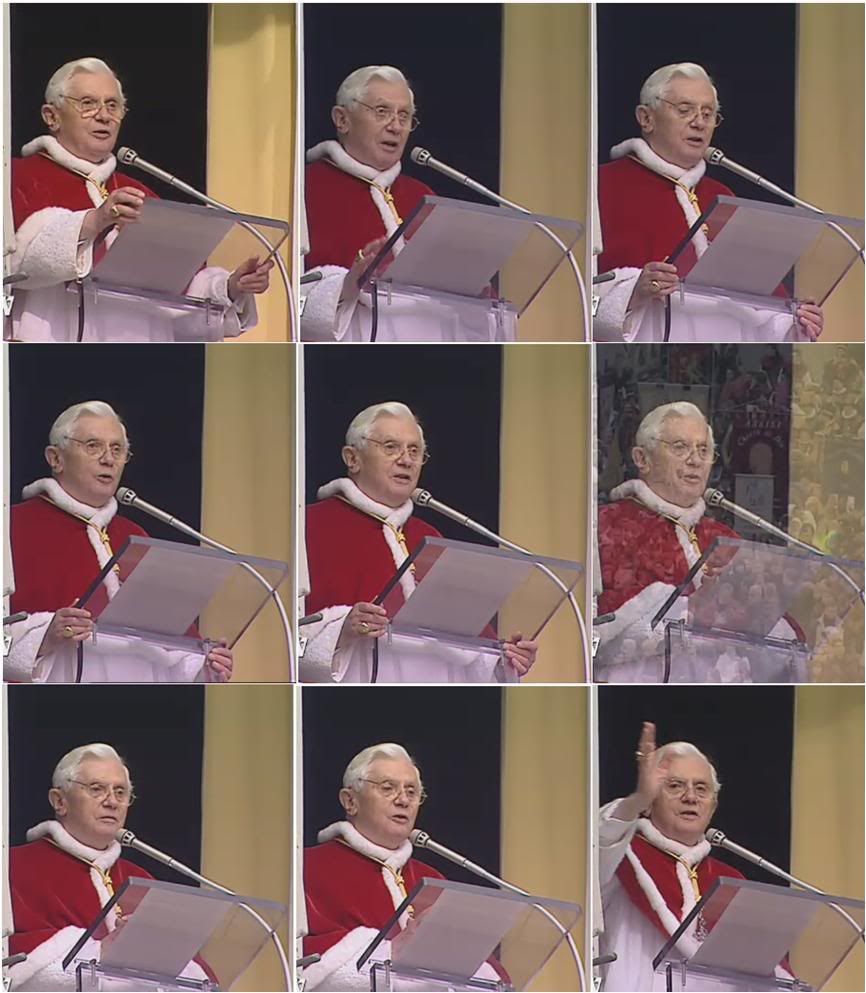 Here is a full translation of the Holy Father's words at the Angelus today:
Here is a full translation of the Holy Father's words at the Angelus today:
Today we celebrate the solemnity of the Epiphany, the 'manifestation' of the Lord. The Gospel narrates how Jesus came to the world in great humility and hiddenness.
St. Matthew nonetheless cites the episode of the Magi who came from the east, led by a star, in order to render homage to the newborn King of the Jews.
Every time we listen to this story, we are struck by the sharp contrast between the attitude of the Magi, on the one hand, and of Herod and the Jews, on the other.
In fact, the Gospel says that upon hearing the words of the Magi, King Herod 'was greatly troubled, and all Jerusalem with him" (Mt 2,3). A reaction that can have different interpretations: Herod is alarmed, because he sees in him whom the Magi seek a rival for himself and for his children. The chiefs and residents of Jerusalem, on the other hand, seemed more stunned than anything else, as if they had been awakened from a certain torpor and needed to reflect.
Isaiah had, in fact, pre-announced: "For a child is born to us, a son is given us; upon his shoulder dominion rests. They name him Wonder-Counselor, God-Hero, Father-Forever, Prince of Peace" (Is 9,5).
Why then was Jerusalem upset? It seems that the Evangelist wished almost to anticipate what would be the attitude of the High Priests and the Sanhedrin, but even of the people, regarding Jesus during his public life.
Certainly, it makes evident that knowledge of Scriptures and of the Messianic prophecies do not bring everyone to open up to Him and his word. We recall that just before his Passion, Jesus wept over Jerusalem because it did not 'recognize the time of its visitation' (cfr Lk 19,44).
This is one of the crucial points in the theology of history: the drama of God's faithful love in the person of Jesus who "came to what was his own, but his own people did not accept him" (Jn 1,11).
In the light of the whole Bible, this attitude of hostility, or ambiguity, or superficiality, represents that of every man and of 'the world' - in a spiritual sense - when they close themselves off from the mystery of the true God, who comes to us in the disarming gentleness of love.
Jesus, the 'king of the Jews' (cfr Jn 18,37), is the God of mercy and faith. He wants to reign in love and in truth, and asks us to convert ourselves, to abandon bad deeds and to decisively take the way of goodness. In this sense, then, 'Jerusalem' is all of us.
May the Virgin Mary, who accepted Jesus in faith, help us not to close our hearts to the Gospel of salvation. Rather, let us allow ourselves to be conquered and transformed by him, Emmanuel, God who has come among us to make us a gift of his peace and his love.
After the Angelus, he said this:
I address my fervent wishes to our brothers and sisters in the Oriental Churches, who, following the Julian calendar, will celebrate the Holy Nativity tomorrow. May the memory of the Savior's birth kindle ever more in their hearts the joy of being loved by God.
Remembering our brothers in the faith leads me in spirit to the Holy Land and the Middle East. I continue to follow with great apprehension the violent armed encounters taking place in the Gaza Strip. While I repeat that hatred and the rejection of dialog can only lead to war, I wish today to encourage the initiatives and efforts of those who, having peace at heart, are seeking to make Israelis and Palestinians agree to sit down and talk. May God support the commitment of these courageous 'makers of the peace'.
The Feast of the Epiphany, in many countries, is also the feast of children. Therefore, my thoughts go to all children, who are the wealth and blessing of the world, but especially to the many who are denied a peaceful childhood.
I wish, in particular, to call attention to the dozens of children and youths who, in the past months, including the Christmas season, have been kidnapped by armed bands who attack villages, causing numerous deaths and injuries, in the eastern province of the Democratic Republic of the Congo.
I appeal to those responsible for such inhuman brutalities to return these children to their families and to a future of security and growth, to which they have a right along with the beloved peoples of that region.
I also express my spiritual nearness to the local Churches, including those that have been directly struck in their personnel and in their work, even as I exhort the Pastors and the faithful to be strong and firm in hope.
The episodes of violence against children, which unfortunately also take place in other parts of the world, appear even more deprecable considering that 2009 is the 20th anniversary of the international Convention on Children's Rights.
This is a commitment that the international community is called on to renew in order to defend, protect and promote the children of the world.
May the Lord help those - and they are innumerable - who work daily in the service of the new generations, helping them to be protagonists for their own future.
Besides, the Day of Missionary Children, which the Church celebrates today on the Feast of the Epiphany, is a timely occasion for demonstrating how children and young people can play an important role in spreading the Gospel and in brotherly works to their more needy contemporaries. May the Lord reward them!
In English, he said:
I greet all the English-speaking visitors who join us for this Angelus prayer.
On this feast of the Epiphany, the Church celebrates the revelation of Christ, the Eternal Son of the Father, as the light of the nations and the Saviour of all mankind.
May the radiance of the Lord’s glory fill you and your families with deep spiritual joy, and draw men and women everywhere to faith and new life in him!
To the Italians, he said:
I also greet those who are taking part in the pageant-procession "Viva la Befana', inspired this year by the folklore of the city and region of Assisi.
'Befana'* comes from 'Epiphany'. and therefore, I greet all the children of Rome on this feast, as well as the adults, that they may retain the spirit of childhood. Best wishes to all!
* La Befana, in Italian folklore, is the old woman who brings gifts to children on Twelfth Night (Epiphany being the 12th day after Christmas), as well as lumps of coal for the undeserving.
|
 11/01/2009 16:43 11/01/2009 16:43 |
|
| | | OFFLINE | | Post: 16.232 | Registrato il: 28/08/2005
| Utente Gold | |
|
HOMILY, FEAST OF THE BAPTISM OF OUR LORD
with Baptism of Babies, Sistine Chapel, 1/11/09
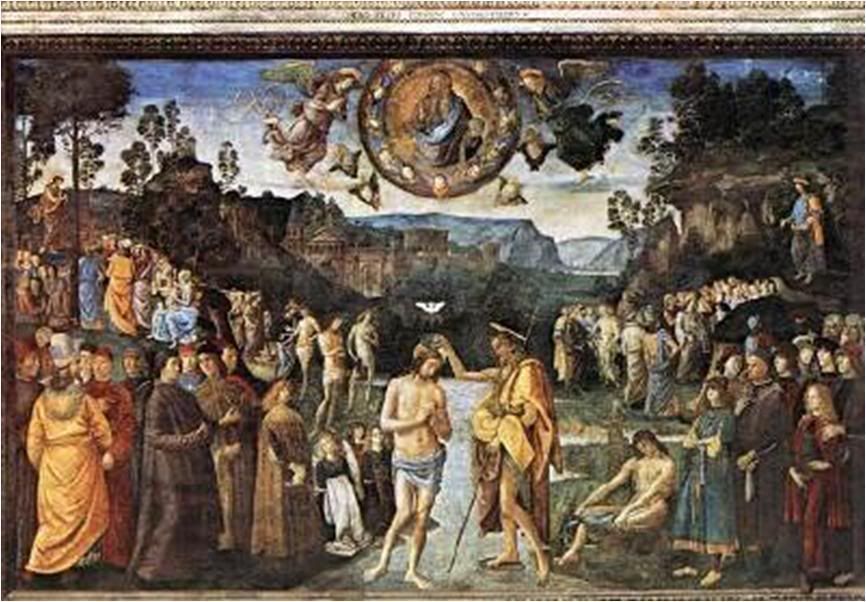 Baptism of Jesus, Perugino/Pinturicchio, c. 1482. Fresco, 325x540 cm, Sistine Chapel.
At 10 a.m. today, the Holy Father presided at Holy Mass in the Sistine Chapel, at which he administered Baptism to 13 babies. Here is a translation of his homily
Baptism of Jesus, Perugino/Pinturicchio, c. 1482. Fresco, 325x540 cm, Sistine Chapel.
At 10 a.m. today, the Holy Father presided at Holy Mass in the Sistine Chapel, at which he administered Baptism to 13 babies. Here is a translation of his homily:
Dear brothers and sisters:
The words used by the evangelist Mark at the start of his Gospel - "You are my beloved Son; with you I am well pleased" - introduce us to the heart of today's Feast of the Baptism of our Lord, which concludes the Christmas season.
The cycle of the season's solemnities allowed us to meditate on the birth of Jesus announced by angels surrounded by the luminous splendor of God. Christmastide speaks to us of the star that led the Magi from the east to the house in Bethlehem, and invites us to look up to heaven which opened up on the Jordan while the voice of God resounded.
They are all signs through which the Lord does not tire of repeating to us: "Yes, I am here. I know you and I love you. There is a road from me that leads to you. And there is a road that leads from you to me."
The Creator took on in Jesus the dimensions of a baby, of a human being like us, so that we can see and touch him. At the same time, by making himself small, the Lord has let shine forth the light of his greatness. By humbling himself to the seemingly helpless impotence of love, he shows us what is true greatness - what it means to be God.
The meaning of Christmas, and more generally, the meaning of the liturgical year, is precisely to bring us closer to these divine signs, to recognize that they are impressed on the events of every day, so that our hearts may open up to the love of God.
If the Nativity and the Epiphany serve above all to make us capable of seeing, to open our eyes and heart to the mystery of a God who comes to be with us, the Feast of the Baptism of Jesus introduces us, we might say, to the quotidianity of a personal relationship with him.
In fact, through immersion in the waters of the Jordan, Jesus united himself to us. Baptism is, so to speak, the bridge that he built between himself and us, the road through which he makes himself accessible to us.
Baptism is the divine rainbow over our lives, the promise of God's great Yes, the gate of hope, and at the same time, the sign which shows us the path to follow actively and joyously in order to meet him and feel his love.
Dear friends, I am truly very glad that even this year, on this feast day, I have been given the opportunity to baptize babies. On them today rests God's 'pleasure'.
From the time the Son of God had himself baptized, Heaven truly opened up and continues to be open, so that we can entrust every new life that blossoms in the hands of him who is more powerful than the dark forces of evil.
In effect, that is what Baptism is: we return to God that which has come from him. The child is not the property of its parents, but is entrusted to their responsibility by the Creator, freely and always in a new way, so that they can help the child become a free child of God.
Only if the parents can ripen this awareness will they succeed in finding the right balance between the claim of being able to dispose of their children as if they were their private possession to be formed according to their personal ideas and desires, and the liberatory attitude of allowing them to grow up in full autonomy, satisfying their every desire and aspiration, considering this the right way to cultivate their individual personality.
If, with this sacrament, the newly baptized baby becomes an adopted child of God, the object of his infinite love which will protect and defend him from the dark forces of evil, one must teach him to recognize God as his father and to learn to relate to him as a son.
Thus, when, following Christian tradition as we do today, children are baptized, introducing them to the light of God and to his teachings, it is not to do them violence, but to give them the richness of divine life in which is rooted the true freedom proper to God's children - freedom that must be educated and formed over the years so that they may be able to make responsible personal choices.
Dear parents, dear godparents, I greet you all with affection and join in your joy over these small ones who today are born into eternal life. Be aware of the gift thus received and do not stop thanking the Lord who, with today's sacrament, introduces your children to a new family, larger and more established, more open and numerous, than the domestic family.
I refer to the the family of believers, to the Church, a family that has God for its Father, and in which all recognize each other as brothers in Jesus Christ.
So today you entrust your children to the goodness of God, who is the force of light and love - they will never feel abandoned if they remain united to Him.
Therefore, take care to educate them in the faith, to teach them to pray and to grow as Jesus did, with his help, "in wisdom, age and grace before God and men" (cfr Lk 2,52).
Turning now to the Gospel, let us try to understand further what is happening today. St. Mark narrates that, while John the Baptist was preaching along the banks of the Jordan, proclaiming the urgency of conversion in view of the imminent coming of the Messiah, Jesus came among the people, resenting himself to be baptized.
John's baptism was certainly one of penitence, but very different from what Jesus would institute. A that moment, the mission of the Redeemer was evident when, upon emerging from the river, a voice echoed from heaven andthe Holy Spirit descended upon him (cfr Mk 1,10).
The heavenly Father proclaimed him his beloved Son and publicly attested his universal mission of salvation which woud be fulfilled with his death of the Cross and his Resurrection.
Only then, with the Paschal sacrifice, is the remission of sins rendered universal and total. With Baptism, we do not simply immerse ourselves in the waters of the Jordan to proclaim our commitment to conversion, but the redeeming blood of Christ pours over us to purify us and to save us.
It is the beloved Son of the Father, in whom he was well pleased, who gives us back our dignity and the joy of calling ourselves truly 'children' of God.
In a while we will relive the mystery evoked by today's solemnity: the signs and symbols of the sacrament of Baptism will help us to understand what the Lord works in the hearts of these babies, making them 'his' for always, the chosen dwelling of his Spirit and 'living stones' for the construction of the spiritual edifice that the Church is.
May the Virgin Mary, Mother of Jesus, the beloved Son of God, watch over them and their families, and accompany them always in order to realize the plan of salvation which Baptism achieves in their lives.
And we, dear brothers and sisters, let us accompany them with our prayers. Let us pray for their parents, godparents and relatives so they may help them grow in the faith. Let us pray for all present here so that, participating devoutly in this celebration, we may renew the promises of our Baptism and give thanks to the Lord for his constant assistance. Amen.
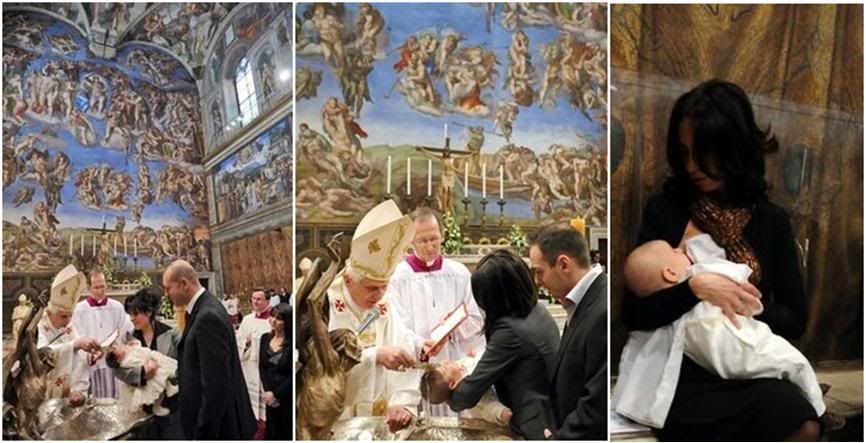
 |
 11/01/2009 16:46 11/01/2009 16:46 |
|
| | | OFFLINE | | Post: 16.233 | Registrato il: 28/08/2005
| Utente Gold | |
|
ANGELUS OF 1/11/08
After the Sistine Chapel Mass, the Holy Father led the usual noontime Angelus from his window overlooking St. Peter's Square. Here is a full translation of his words before the Angelus prayers:
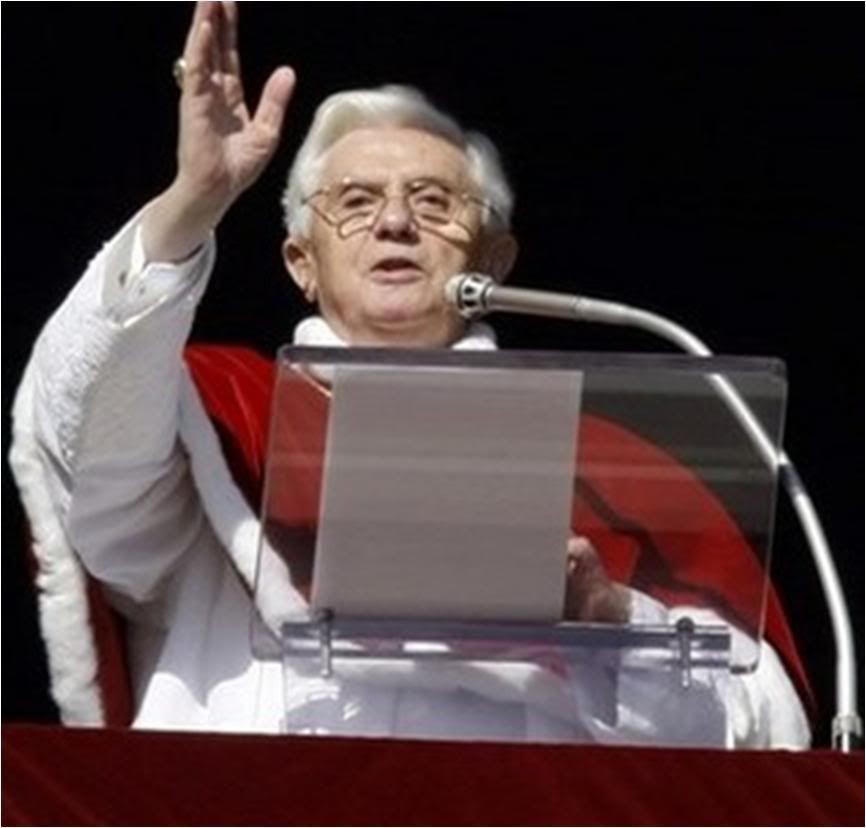
Dear brothers and sisters!
On this Sunday which follows the Solemnity of the Epiphany, we celebrate the Baptism of the Lord. This was the first act of his public life, and it is narrated in all four Gospels.
When he was about 30 years old, Jesus left Nazareth, came to the river Jordan, and amid many others, had himself baptized by John.
The evangelist Mark writes: "On coming up out of the water he saw the heavens being torn open and the Spirit, like a dove, descending upon him. And a voice came from the heavens, 'You are my beloved Son; with you I am well pleased'"(Mk 1,10-11).
Those words - "You are my beloved Son" - reveal what eternal life is: it is the filial relationship with God, as Jesus lived it and as it has been revealed and given to us.
This morning, following tradition, I administered the sacrament of Baptism in the Sistine Chapel to 13 newborn babies.
To the parents and godparents, the celebrant usually asks, "What do you ask the Church of God for your children?" To their answer, "Baptism", he asks, "And what does Baptism give us?" They reply, "Eternal life".
That is the stupendous reality - the human being, through Baptism, becomes invested in the unique and singular relationship of Jesus with the Father, such that the words which resounded from heaven on the only-begotten Son become true for every man and woman who is reborn from the water and the Holy Spirit: You are my beloved Son.
Dear friends, how great is the gift of Baptism! If we only fully considered it, our livea would be a continuous 'grace'. What joy for Christian parents who have seen a new creature bud forth from their love, bring him to the baptismal font and see him reborn in the womb of the Church for a life that will never have an end.
A gift, A joy, but also responsibility. Parents, in fact, along with the godparents, should educate children according to the Gospel.
This brings me to the theme of the VI World Encounter of Families which will take place in the next few days in Mexico City: "The family as educator in human and Christian values".
This huge meeting among families, organized by the Pontifical Council For the Family, will take place on three levels: first, the Theological-Pastoral Congress, in which the theme will be discussed in depth, including an interchange of significant experiences in family life; then, the time of celebration and testimony, which will evoke the beauty of this encounter among families from all over the world, united in the same faith and the same commitment; and finally, the solemn Eucharistic celebration, as an act of thanksgiving to the Lord for the gifts of matrimony, family and life.
I have asked the Cardinal Secretary of State Tarcisio Bertone to represent me there, but I myself will be following this extraordinary event closely, accompanying it with my prayers, and participating through video-conference.
I ask you now, dear brothers and sisters, to implore the abundance of divine graces for this important world encounter of families. Let us do so, invoking the maternal intercession of the Virgin Mary, Queen of the family.
This is what he said in English after the prayers:
To all the English-speaking visitors and pilgrims here today, I extend affectionate greetings.
On this feast of the Lord’s Baptism, Jesus descends into the waters of the Jordan, taking on himself the weight of our sins. When he rises from the water, the Spirit comes down upon him and the Father’s voice declares: "This is my beloved Son".
Let us rejoice that the Son of God came to share our human condition, so that we might rise with him to everlasting life.
Upon all who are here today, and upon your families and loved ones at home, I invoke God’s abundant blessings.
|
 18/01/2009 16:23 18/01/2009 16:23 |
|
| | | OFFLINE | | Post: 16.311 | Registrato il: 28/08/2005
| Utente Gold | |
|
ANGELUS of 1/18/09
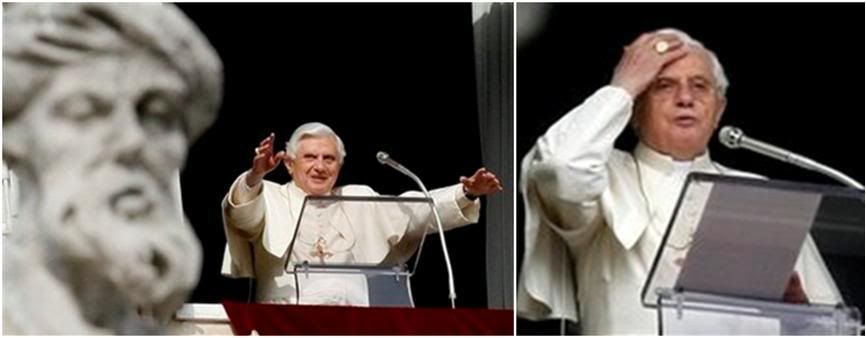 Here is a full translation of the Holy Father's words:
Here is a full translation of the Holy Father's words:
Dear brothers and sisters!
Today is the annual World Day for Migrants and Refugees. Since we are celebrating the Pauline Year, I chose the theme "St. Paul migrant, Apostle of the Gentiles" in honor of St. Paul as the great itinerant missionary of the Gospel.
Saul - his name in Hebrew - was born of a Jewish family who had migrated to Tarsus, an important city of Cilicia [now in Turkey], and grew within a triple culture - Jewish, Hellenistic and Roman - and with a cosmopolitan mentality.
When he converted from being a persecutor of Christians to become an Apostle of the Gospel, Paul became the 'ambassador' of the risen Christ to make him known to everyone, in the belief that in him, all peoples are called to become the great family of the children of God.
This is also the mission of the Church, and more than ever in this time of globalization. As Christians, we cannot fail to note the need to transmit Jesus's message of love, especially to those who do not know him, or who find themselves in difficult and painful situations.
Today, I think particularly of migrants. Their reality is quite diverse: in some cases, thank God, they are serene and well integrated; other times, unfortunately, their situation is pathetic, difficult and even tragic.
I wish to give assurances that the Christian community looks at every person and every family with attention, and asks through St. Paul for the strength of renewed efforts to favor, in every part of the world, the peaceful coexistence among men and women of different races, cultures and religions.
The apostle tells us what was the secret of his new life: "I have indeed been taken possession of by Christ (Jesus)" (Phi 3,12), and he adds, "Be my imitators (Phi 3,17).
Yes, each of us, according to our own calling and wherever we live and work, is called on to bear witness to the Gospel, with greater attention for those brothers and sisters from other countries who, for various reasons, have come to live among us, thus placing value on the phenomenon of migration as a meeting of civilizations.
Let us pray and act so that this may always take place peacefully and constructively, in respect and in dialog, avoiding every temptation of conflict and oppression.
I wish to add a special word for sailors and fishermen who are living through times of major perils. In addition to their customary difficulties, they are encountering landing restrictions in order to take chaplains on board, as much as they have to face the risk of piracy and the dangers of illegal fishing.
I express to them my closeness and the wish that their generosity in carrying out rescue activities on the high seas may be rewarded with greater consideration.
Finally, my thoughts go to the World Encounter of Families which ends today in Mexico City, and the Week of Prayer for Christian Unity which begins today.
Dear brothers and sisters, I ask you to pray for all these intentions, invoking the maternal intercession of the Virgin Mary.
After the Angelus prayers he had more messages:
I continue to follow with profound trepidation the conflict in the Gaza Strip. Let us remember to the Lord today the hundreds of children, old people, and women who have fallen innocent victims to unprecedented violence; the wounded; those who mourn the loss of loved ones; and those who have lost their possessions.
I ask you at the same time to accompany with prayers the efforts of numerous persons of good will to stop the tragedy. I sincerely hope that they may take advantage wisely of small openings in order to renew the ceasefire and proceed towards lasting peaceful solutions.
In this sense, I renew my encouragement to those who, on both sides, believe that there is room for everyone in the Holy Land, so they may help their people rise from ruins and from terror, and courageously resume dialog in a spirit of justice and truth.
This is the only way that can effectively lead to a future of peace for the children of that beloved region.
Today we start the Week of Prayer for National Unity which will end next Sunday, January 25. In the southern hemisphere, following the nine-day period decreed by Pope Leo XIII at the end of the 19th century, the prayer week for Christian Unity takes place between Ascension and Pentecost.
But the Biblical theme is common to all. This year, the theme, suggested by an ecumenical group in Korea, is taken from the Book of the prophet Ezechiel: "[ Then join the two sticks together,] so that they form one stick in your hand" (Ez 37,17).
Let us make this invocation ourselves and let us pray with greater intensity so that Christians may walk together with determination towards full communion among themselves.
I address myself in particularly to Catholics all over the world so that, united in prayer, they may never tire of working to overcome the obstacles that still impede full communion among all the disciples of Christ.
The ecumenical commitment is even more urgent today, in order to give our society, which is marked by tragic conflicts and lacerating divisions, a sign and an impetus towards reconciliation and peace.
We will conclude this Week of Prayer for Christian Unity at the papal basilica of St. Paul outside the Walls with the celebration of Vespers next Sunday, on the commemoration of the Conversion of St. Paul, who made the unity of the Body of Christ an essential nucleus of his preaching.
Also today, the Diocese of Rome celebrates the Diocesan Day for Catholic Schools. I greet the authorities, administrators, teachers, parents and students who are gathered here today.
Dear friends, the educational service of Catholic schools is more than ever valuable today, because children and young people need to receive valid instruction with a consistent vision of man and life.
I accompany with prayers all those who teach and study in the Catholic schools of Rome, and I encourage them to always be committed to the formation of educational communities rich in human and Christian values.
In English, he said:
I am happy to greet all the English-speaking pilgrims and visitors present for today’s Angelus.
As we celebrate the week of prayer for Christian unity, let us continue to ask the Lord that all who invoke his name may be one, so that the world may believe.
On this World Day of Migrants and Refugees, I encourage individuals, communities and institutions to be generous to all who have left their homeland.
May the Father of mercies open our eyes and our hearts to the sufferings and needs of those who have entrusted themselves to our hospitality.
I wish you all a pleasant stay in Rome and a blessed Sunday!
|
 01/02/2009 20:18 01/02/2009 20:18 |
|
| | | OFFLINE | | Post: 16.450 | Registrato il: 28/08/2005
| Utente Gold | |
|
ANGELUS OF 1/25/09
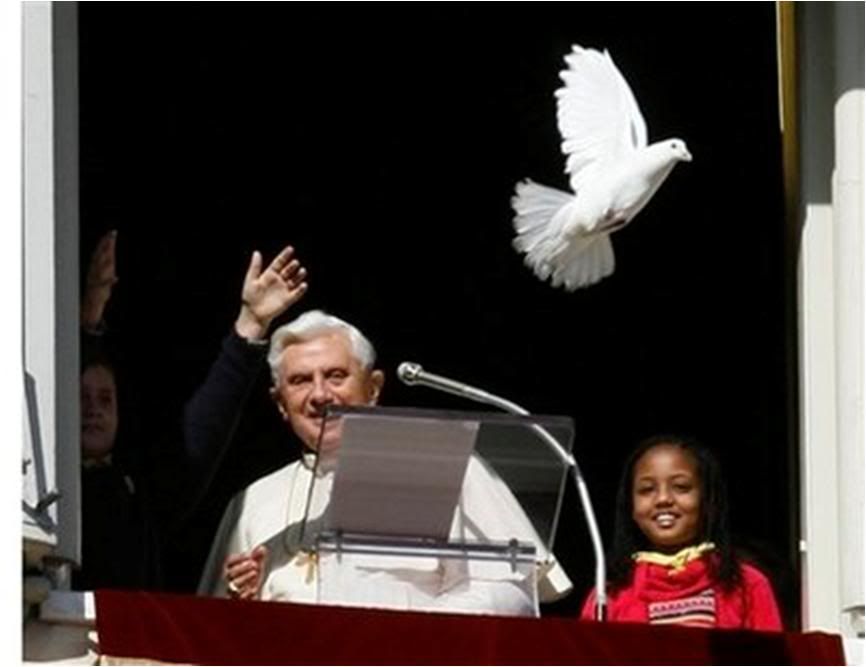 Here is a full translation of what the Holy Father said at the Angelus today:
Here is a full translation of what the Holy Father said at the Angelus today:
Dear brothers and sisters:
In the Gospel on this Sunday we hear the words of Jesus's first preaching in Galilee: "This is the time of fulfillment.
The kingdom of God is at hand. Repent, and believe in the gospel" (Mk 1,15).
And today, January 25, we commemorate the Conversion of St. Paul. A happy coincidence - especially during this Pauline Year -
thanks to which we can understand the true significance of evangelical conversion, a metanoia, by looking at the apostle's
experience.
Actually, in Paul's case, some prefer not to use the term conversion, because, they say, he was already a believer, indeed he was
a fervent Jew, and so , he did not pass from non-faith to faith, from idols to God, nor did he have to abandon his Jewish faith
in order to adhere to Christ.
But in fact, the Apostle's experience can well be the model of every authentic Christian conversion.
That of Paul matured in his encounter with the risen Christ: it was this meeting which changed his existence radically.
On the road to Damascus, what Jesus asks in today's Gospel happened to him: Saul was converted because, thanks to divine light,
"he believed in the Gospel".
His and our conversion consists in this: believing in Jesus who died and rose again, and in opening ourselves to the illumination
of his divine grace.
At that moment, Saul understood that his salvation did not depend on good works done according to the Law, but on the fact
that Jesus died even for him, the persecutor, and that he had risen, and is risen.
This truth which, thanks to Baptism, illumines the existence of every Christian, completely overturns our way of life. To convert
means, even for each of us, to believe that Jesus 'gave himself for me", dying on the Cross (cfr Gal 2,20), and resurrected,
lives with me and in me.
Entrusting myself to the power of his forgiveness, allowing him to take me by the hand, I can leave the moving sands of pride
and sin, of lies and sorrow, of selfishness and every false security, to know and live the richness of his love.
Dear friends, the invitation to convert,, enriched by the testimony of St. Paul, resounds today, at the end of the Week of
Prayer for Christian Unity, which is also particularly important on the ecumenical level.
The Apostle shows us the spiritual attitude that is adequate in order to be able to proceed along the way of communion. "It is not
that I have already taken hold of it or have already attained perfect maturity," he writes to the Philippians, "but I continue
my pursuit in hope that I may possess it, since I have indeed been taken possession of by Christ Jesus (Phil 3,12).
Certainly, we Christians have not yet reached the goal of full unity, but if we allow ourselves to be continually converted by
the Lord Jesus, we will certainly reach it.
May the Blessed Virgin Mary, Mother of the one and holy Church, obtain for us the gift of true conversion, so that Christ's desire
'Ut unum sint" (that they may be one) may be realized as early as possible.
To her we also entrust the prayer meeting that i will preside over this afternoon at teh Basilica of St. Paul outside the Walls,
and at which, as they do every year, representatives of the Christian Churches and ecclesial communities present in Rome will take part.
After the Angelus prayers, he said this:
Today is the World Day for Lepers, started 55 years ago by Raoul Follereau. The Church, following Jesus. has always paid
special attention to persons who have this illness, as testified once more by teh message released a few days ago by the
Pontifical Council for Ministering to Health.
I am happy that the United Nations, with the recent Declaration of its High Commission for Human Rights, has called upon
all states to protect adn care for those afflicted with leprosy and for their families.
On my part, I assure them of my prayers and renew my encouragement for all who are battling with them towards full healing
and a proper place in society.
The peoples of many countries in Eastern Asia are preparing to observe the Lunar New Year. I wish them joy in their
celebrations. Joy is the expression of being in harmony with oneself, and this can come only from being in harmony with God
and his creation. May joy always live in the hearts of all the citizens of these nations who are very dear to me,
and may this radiate throughout the world.
And now, I greet with great affection the children and young people of the Catholic Action of Rome, and of some parishes
and schools in the city who took part in teh annual Caravan for Peace. I greet the Cardinal Vicar [Agostini Vallini]
who accompanied you.
Dear children, I thank you for your faithful commitment to peace, a commitment not so much of words, but of choices and acts,
as your representative will say, to whom I now yield. I give the word to Miriam, an Eritrean girl who is now a Roman.

[ Miriam reads a message and a prayer.*]
Dear children, with the help of Jesus, may you always be makers of the peace at home, in school, in sports and everywhere.
Once again, thank you!
[Modificato da TERESA BENEDETTA 01/02/2009 20:34] |
 01/02/2009 20:34 01/02/2009 20:34 |
|
| | | OFFLINE | | Post: 16.451 | Registrato il: 28/08/2005
| Utente Gold | |
|
ANGELUS OF 2/1/09
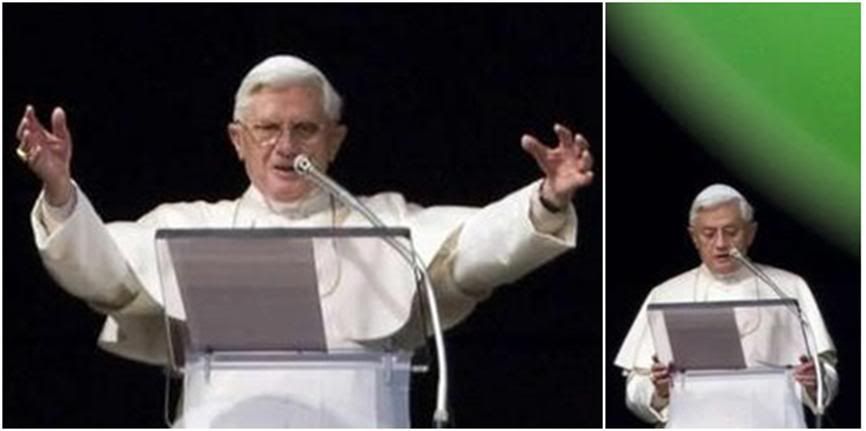
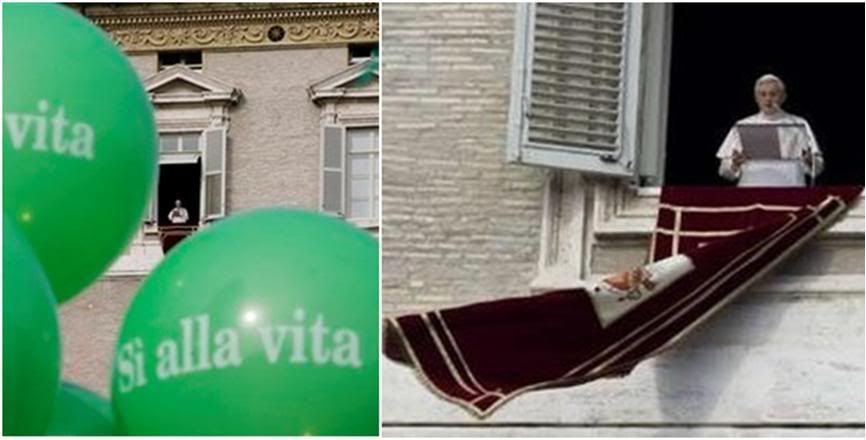 Here is a full translation of the Holy Father's words at the Angelus today:
Here is a full translation of the Holy Father's words at the Angelus today:
Dear brothers and sisters!
This year, on this Sunday, the liturgy offers for our meditation the Gospel of St. Mark, of which a singular characteristic is the so-called 'messianic secret' - the fact that for the moment, Jesus did not wish it known to others, outside of the tight group of disciples, that He was the Christ, the Son of God.
That is why he repeatedly admonished the apostles, as well as the sick whom he cured, not to reveal his identity to anyone. For example, the Gospel passage today (Mk 1,21-28) tells of a man who was possessed by the devil, who suddenly cries out: "What have you to do with us, Jesus of Nazareth? Have you come to destroy us? I know who you are--the Holy One of God!"
Jesus rebukes him and says, "Quiet! Come out of him!" And immediately, notes the evangelist, the evil spirit with a cry came out of the man.
Jesus not only chased out the demons from persons, freeing them of their worst slavery, but forbade the devil himself from revealing his identity.
He insisted on this 'secret' because the success of his very mission was in play, a mission on which our salvation depended. He knew that to free mankind from the dominion of sin, He had to be sacrificed on the Cross as the Paschal Lamb.
For his part, the devil sought to dissuade him and turn him to the human logic of a powerful Messiah filled with worldly success. The Cross of Christ is the ruin of the devil, and that is why Jesus did not cease to teach his disciples that in order to enter into his glory, he had to suffer much, be rejected, condemned and crucified (cfr Lk 24,25), suffering being an integral part of his mission.
Jesus suffered and died on the Cross for love. In this way, we can see, he gives sense to our suffering, a sense that many men and women today have understood and made their own, experiencing profound serenity even in the bitterness of harsh physical and moral trials.
It is precisely "the strength of life in suffering' that the Italian bishops have chosen as the theme for their message on the Day for Life today. I join with all my heart in their words which express the love of Pastors for their people, and the courage to announce the truth, the courage to say clearly, for instance, that euthanasia is a false solution to the tragedy of suffering, a solution that is unworthy of man.
In fact, the true response cannot be to grant death, no matter how 'gentle', but to bear witness to love which helps to face pain and agony in a human way. We can be sure of this: no tear - neither of those who suffer or those who are near them - is lost before God.
The Virgin Mary kept in her heart the secret of her Son and shared the sorrowful hours of his Passion and Crucifixion, sustained by the hope of the resurrection.
Let us entrust to her the persons who are suffering and those who try to sustain them every day, serving life in its every stage - parents, health care givers, priests, religious, researchers, volunteers, and many others. Let us pray for all.
After the Angelus, he said this:
Tomorrow we will celebrate the liturgical Feast of the Presentation of Jesus at the Temple. Forty days after the birth of Jesus, Mary and Joseph took him to Jerusalem, following the prescription of the Mosaic Law.
Every firstborn, according to Scriptures, belongs to the Lord, and should therefore be ransomed with a sacrifice. In this event, Jesus was consecrated to God the Father, and linked to that consecration, was that of the Virgin Mary.
That is why my beloved predecessor John Paul II wished that this occasion, on which many consecrated persons make or renew their vows, also become the Day for Consecrated Life.
Tomorrow afternoon, therefore, after the Holy Mass at St. Peter's Basilica presided by the Prefect of the Congregation for the Institutes of Consecrated Life and the Societies of Apostolic Life, I will meet with consecrated persons present in Rome.
I invite everyone to thank the Lord for the precious gift of these brothers and sisters and to ask him, through the intercession of Our Lady, for many more new vocations in the variety of charisms of which the Church is rich.
And in his concluding greeting in Italian, he said:
I greet the Italian-speaking pilgrims, particularly the Movement for Life, the delegations of the faculties of medicine and surgery from the various universities of Rome, and all those who are committed to the defense and promotion of the fundamental good which is life.
I appreciate and encourage the commitment of the Diocese of Rome in this field, and I extend my most heartfelt wishes as well for Family Week which begins today.
|
 08/02/2009 23:10 08/02/2009 23:10 |
|
| | | OFFLINE | | Post: 16.538 | Registrato il: 28/08/2005
| Utente Gold | |
|
ANGELUS OF 2/8/09
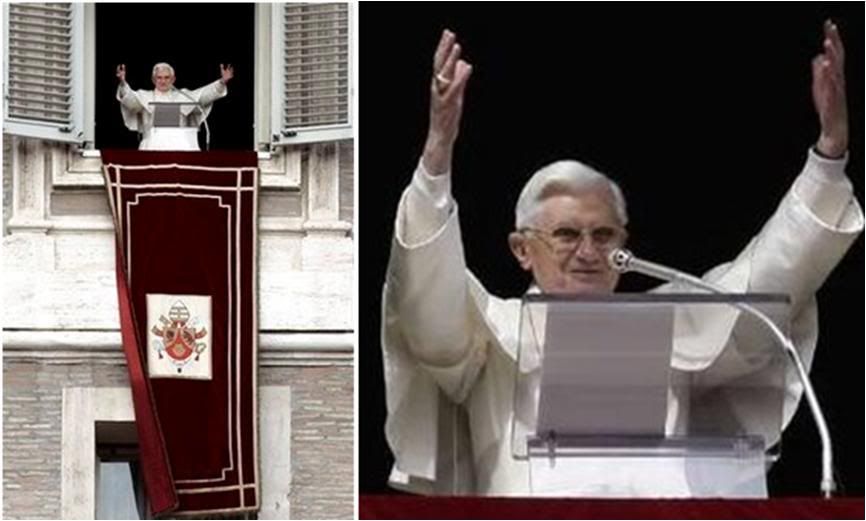 Here is a full translation of the Holy Father's words at the Angelus today.
Here is a full translation of the Holy Father's words at the Angelus today.
Dear brothers and sisters,
The Gospel today (cfr Mk 1,29-39) – in close continuity with that of last Sunday - presents us with Jesus who, after having preached on the Sabbath in the synagogue in Capharnaum, heals many sick persons, starting with Simon Peter's mother-in-law.
Entering her home, he finds her in bed with a fever, and immediately, taking her by the hand, heals her and makes her get up. After sunset, he heals a multitude of persons afflicted with all sorts of ailments.
Healing the sick occupied a good part of the public mission of Christ, and we are asked once more to reflect on the sense and the value of sickness in every situation that the human being may find himself.
This opportunity is also given to us by the World Day for the Sick, which we will mark on Wednesday, February 11, on the memorial day of the Blessed Virgin of Lourdes.
Although sickness is part of the human experience, we cannot get used to it, not only because at times, it becomes truly difficult and grave, but essentially because we are made for life, a complete life.
Quite rightly, our 'interior instinct' makes us think of God as the fullness of life, or more correctly, as eternal perfect life. When we are tried by illness and our prayers seem to be in vain, then doubt arises in us, and we ask in anguish: What is God's will?
We find the answer to this question in the Gospel. For example, in today's Gospel, we read that "he cured many who were sick with various diseases, and he drove out many demons" (Mk 2,34).
In another passage from St. Matthew, we are told "(Jesus) went around all of Galilee, teaching in their synagogues, proclaiming the gospel of the kingdom, and curing every disease and illness among the people" (Mt 4,23).
Jesus does not leave any doubt: God - whose face he himself has shown us - it the God of life, who liberates us from every evil. The signs of the power of his love are the healings he performed - he demonstrates thereby that the Kingdom of God is near by restoring men and women to full integrity in spirit and body.
These healings are signs: they call attention to the message of Christ. Tthey lead us to God and make us know that the true and most profound illness of man is the absence of God, of the source of truth and love.
Only reconciliation with God can give us true healing, true life, because life without love and without truth would not be life. The Kingdom of God is precisely the presence of truth and love, and healing in the depth of our being.
Thanks to the action of the Holy Spirit, the work of Jesus is extended though the mission of the Church. Through the Sacraments, Christ communicates his life to multitudes of brothers and sisters, even as he comforts numberless sick persons through the health care activities that the Christian community promotes with fraternal charity, thus showing the face of God, his love.
It is true: How many Christians - priests, religious and laymen - in every part of the world have lent and continue to lend their hands, their eyes and their hearts to Christ, the true physician of bodies and spirits!
Let us pray for all who are sick, especially those who are in the most serious conditions, who cannot provide for themselves but are totally dependent on the care of others.
May each of them experience, in the solicitude of those around them, the power of God's love and the richness of his saving grace.
Mary, health of the sick, pray for us!
After the Angelus prayers, he said:
In these weeks, strong political tensions have been reported in Madagascar which have led to popular agitations. The bishops of the island have therefore declared today a day of prayer in favor of national reconciliation and social justice.
Strongly concerned for this particularly critical period that the nation is undergoing, I ask you to join the Malagasian Catholics in entrusting to God those who died in the demonstrations and to ask him, through the intercession of the Most Blessed Mary, a return to concord, social tranquillity and civil coexistence.
As I mentioned earlier, the World Day for the Sick will be observed on February 11, memorial of the Blessed Virgin Mary of Lourdes. In the afternoon, I will meet sick persons and other pilgrims in St. Peter's Basilica, after Holy Mass presided over by the president of the Pontifical Council for Pastoral Health Ministry, Cardinal Lozano Barragan.
Meanwhile, I assure my special blessing to all who are sick, to health care workers, and to volunteers in every part of the world.
|
 15/02/2009 19:33 15/02/2009 19:33 |
|
| | | OFFLINE | | Post: 16.605 | Registrato il: 28/08/2005
| Utente Gold | |
|
ANGELUS OF 2/15/09
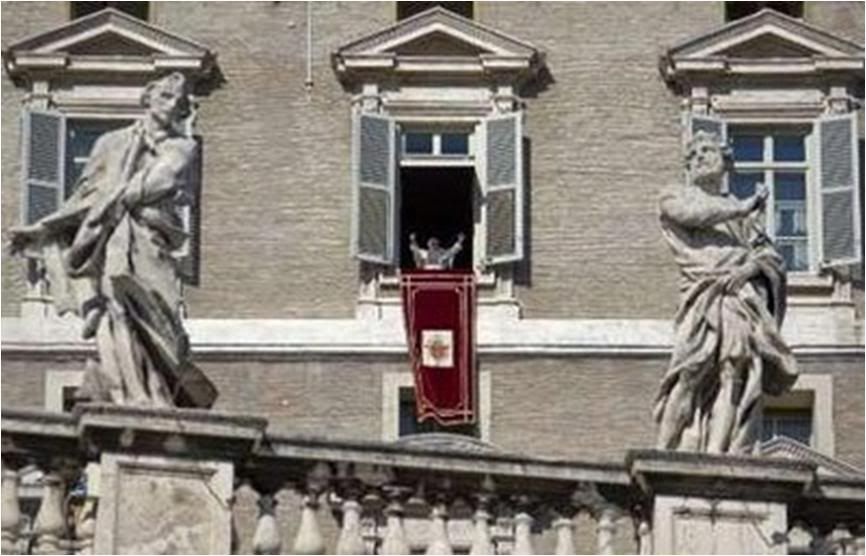 Here is a full translation of the Holy Father's words:
Here is a full translation of the Holy Father's words:
Dear brothers and sisters!
In the Sunday Gospels at this time, the evangelist St. Mark offers a series of miraculous healings by Jesus for our reflection.
Today, we are presented with a singular case, a leper who was cured (cfr Mk 1, 4045) after approaching Jesus and imploring on his knees: "If you wish, you can make me clean".
Moved with pity, Jesus stretched out his hand, touched him, and said to him, "I do will it. Be made clean."
And instantly, the man was healed, and Jesus asked him not to tell anybody, but to present himself to a priest to offer the sacrifice prescribed by Mosaic law.
But the cured leper could not keep silent about it, and proclaimed to everyone what had happened to him.
As a result, the evangelist tells us, even more sick people came to Jesus from everywhere, finally forcing him to stay away from towns in order not to be assailed by crowds.
Jesus told the leper, "Be made clean". According to ancient Jewish law (cfr Lv 13-14), leprosy was considered not just a disease but also the gravest form of 'impurity'.
It was the duty of the priests to diagnose it and declare the sick person unclean, who must then keep apart from the community and live away from inhabited places until any eventual certified healing.
Leprosy therefore constituted a kind of religious and civilian death, and its healing a kind of resurrection. We can see in leprosy a symbol for sin, which is the true impurity of the heart, one able to keep us away from God.
It is not the physical ailment of leprosy, as the old laws saw it, that separates us from him, but sin, the spiritual and moral evil.
That is why the Psalmist exclaims: "Happy the sinner whose fault is removed, whose sin is forgiven" and then, addressing God, "I declared my sin to you; my guilt I did not hide. I said, 'I confess my faults to the LORD', and you took away the guilt of my sin" (Ps 31/32, 1.5).
The sins we commit keep us away from God, and if they are not humbly confessed, with confidence in divine mercy, they can even come to produce the death of the soul.
Thus this miracle [in Mark's Gospel] takes on a strong symbolic value. Jesus, as Isaiah had prophesied, is the Servant of the Lord who "bore our infirmities and endured our sufferings" (cfr Is 53,4).
In his passion, he would become like the leper, made unclean by our sins, separated from God: and all this he would do out of love, in order to obtain reconciliation, forgiveness and salvation for us.
In the Sacrament of Penance, the crucified and resurrected Christ, through his ministers, purifies us with his infinite mercy, restores us to communion with the heavenly Father and with our brothers, makes us a gift of his love, his joy and his peace.
Dear brothers and sisters, let us invoke the Virgin Mary, whom God preserved from every stain of sin, so that she may help us avoid sin and make frequent use of the Sacrament of Confession, the sacrament of forgiveness, which today more than ever must be rediscovered for its value and its importance in our life as Christians.
In English, he said:
I greet all the English-speaking visitors and pilgrims here today for the Angelus, especially the members of the joint Catholic-Orthodox pilgrimage from Finland.
I pray that the time you spend in Rome may deepen your love for Jesus Christ our Lord, and for his Church. In this Sunday’s Gospel, we hear how Jesus healed a leper who came to him and pleaded to be cured.
To those who turn to him today, Jesus continues to offer healing and strength. I encourage all of you to place your trust in him, and to bring before him your hopes and your needs, for yourselves and for your loved ones.
May the Lord grant your prayers and pour out upon all of you his abundant blessings.
Unusually, he had a different message for German- and Spanish-speaking pilgrims. whom he urged to follow the exhortation of the Apostle Paul "to do everything for the glory of God and the good of others - more than one's self interest - following the example of Christ."
His full message in German:
In the second reading this Sunday, St. Paul tells us: "I try to please everyone in every way, not seeking my own benefit but that of the many, that they may be saved" (1 Cor 10,33).
The apostle invites us to imitate him in this attitude. The selfless readiness to help our neighbor should radiate from the center of our heart because in this way, we accept the loving action of God upon us.
That is my duty as a pastor, and I ask you with your prayers and through your good works to sustain me in this service.
May the Lord bless you and your loved ones.
[Modificato da TERESA BENEDETTA 15/02/2009 22:55] |
 21/02/2009 21:35 21/02/2009 21:35 |
|
| | | OFFLINE | | Post: 16.668 | Registrato il: 28/08/2005
| Utente Gold | |
|
'LECTIO DIVINA'
TO THE SEMINARIANS OF ROME
2/20/09
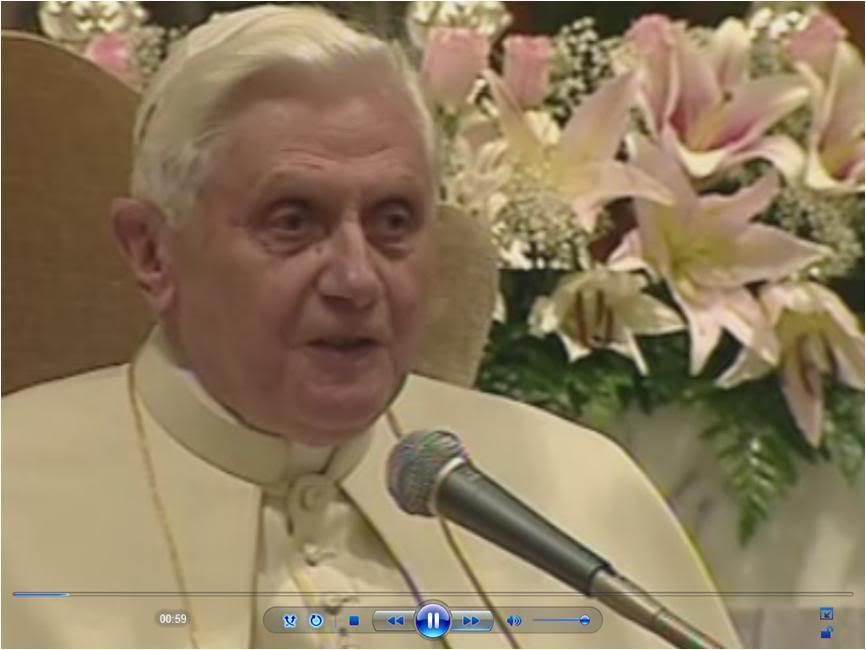 Here is a translation of the full transcript provided by the Vatican of the Holy Father's words to the Seminarians of Rome on Friday evening:
Here is a translation of the full transcript provided by the Vatican of the Holy Father's words to the Seminarians of Rome on Friday evening:
Your Eminence,
Dear friends,
It is always a great joy for me to be in my Seminary, to see the future priests of my diocese, to be with you under the sign of Our Lady of Confidence [Madonna della Fiducia, patroness of the seminary]. With her to help and accompany us, we have the certainty of always being aided by divine grace. So let us move ahead.
Now let us us see what St. Paul tells us with this text: "You are called to freedom".
Freedom has at all times been the great dream of mankind, even from the start, but particularly in modern times. We know that Luther was inspired by this text from the Letter to the Galatians, and he concluded that the monastic Rule, the hierarchy, the Magisterium, appeared to him as a yoke of slavery from which he had to free himself.
Successively, the Age of Enlightenment was totally guided and penetrated by this desire for freedom which it believed it had achieved. But even Marxism would present itself as a road to freedom.
We ask ourselves tonight: What is freedom? How can we be free? St. Paul helps us to understand the complicated reality of freedom by inserting it in the context of fundamental anthropological and theological views.
He says: "Let this freedom not be a pretext to live according to the flesh, but through charity: be of service to one another".
The rector already told us that 'flesh' here does not mean the body. "Flesh' in the language of St. Paul is his expression for the absolutization of the 'I', that 'I' which wishes to be everything and takes everything for himself: the absolute I that does not depend on anything or anyone, and seems to truly possess freedom definitively - "I am free if I don't depend on anyone, if I can do everything I want".
But it is this absolutization of the I which is the 'flesh' - a degradation of man, not a conquest of freedom. Libertinism is not liberty but the failure of it.
Paul dares to propose a strong paradox: "Through charity, you shall be of service" (in Greek, dolerite): that is, freedom is paradoxically realized if we become servants to each other. And thus, Paul places the entire question of freedom in the light of man's truth.
To reduce oneself to 'flesh' - while apparently elevating oneself to the level of divinity - introduces us to untruth. Because it is not so, in truth: Man is not an absolute. It is not as though man can isolate himself and act only according to his own will. It is against the truth of our being.
Our truth is that, above all, we are creatures, creatures of God, and we live in relationship to our Creator. We are relational beings. Only by accepting this relationality can we enter into the truth. Otherwise, we fall into untruth, and in it, ultimately, we destroy ourselves.
We are creatures, and therefore, dependent on the Creator. During the Enlightenment, this idea appeared, above all to atheits, as a dependence which man had to rid himself of.
The truth is that such a dependency would be fatal only if God the Creator was a tyrant not a good being, only if he were like human tyrants.
But if this Creator loves us and our dependence means being within the space of his love, then dependence is freedom. Indeed, in this way, we are in the charity of the Creator, we are united to him, to all his reality, to all his power.
So this is the first point: to be a creature means being loved by the Creator - to be in this relationship of love that he gives us, that he has provided us. From this above all comes our truth, which is, at the same time, a call to charity.
That is why to see God, to orient oneself to God, to know God, to know his will, to put ourselves within his will - which means, in the love of God - is to enter increasingly into the space of truth.
This path to knowledge of God, of a relationship of love with God, is the extraordinary adventure of our life as Christians, who recognize in Christ the face of God - God who loves us to the Cross, to making us the gift of himself.
But our creatural relationship also implies a second relation; We are in relationship with God, but at the same time, in the human family - we are in relationship with one another.
In other words, human freedom, on the one hand, is to be in the joy and wide space of God's love, but it also implies being one with the other and for the other. There is no freedom against the other.
If I absolutize myself, I become an enemy of the other. We cannot then live with one another, and all of life becomes cruelty, failure. Only shared freedom is human freedom - in being together, we can enter the symphony of liberty.
So this is another point of great importance: Only by accepting the other, accepting even the apparent limitation which comes from freedom to respect the freedom of the other, only by setting myself into the network of human dependency which makes us one single family, only then am I on the path toward our common freedom.
Here is a very important element: What is the measure of shared freedom? We see that man needs order, law, so that he can realize his freedom as a freedom lived in common.
And how can we find this just order, in which no one is oppressed, in which each can give his contribution to this concert of freedom? If there is no common truth for man as there is in the sight of God, then what remains is merely positivism, which is like something imposed in a manner that might be called violent. And with it comes a rebellion against order and law as though they represent slavery.
But if we find the Creator's order in our nature, that order of truth which gives everyone his place, then law and order can become instruments of freedom against the slavery of selfishness.
To serve one another becomes an instrument of freedom, in which we can find a whole political philosophy according to the social doctrine of the Church, which helps us find the common order that gives each of us our place in the common life of mankind.
The first reality to respect is truth. Freedom against truth is not freedom. To serve one another creates the common space of freedom.
Paul continues by saying: "The whole law is fulfilled in one statement, namely, you shall love your neighbor as yourself". Behind this statement is the mystery of God incarnated, the mystery of Christ who, in his life, death and resurrection, became the living law.
The first words of our Reading - "You are called to freedom" - refer right away to this mystery. We have been called by the Gospel, we have been truly called in Baptism, to participation in the death and resurrection of Christ, and in this way, we pass from the 'flesh'. from selfishness, to communion with Christ. And thus, we are in the fullness of the law.
You probably know the beautiful words of St. Augustine: "Dilige et fac quod vis" - Love and do what you will. What Augustine says is the truth if we really understand the word 'love'. "Love and do what you will", but we must have entered into communion with Christ, identified ourselves with his death and resurrection, united to him in communion with his Body.
By participating in the sacraments, by listening to the Word of God, then divine will, divine law, will enter our will; our will identifies itself with his; we become just one will, which makes us truly free. We can do what we wish because we wish with Christ, we wish in truth, and we wish with truth.
Let us pray the Lord to help us in this journey begun in Baptism, a path of identifying with Christ which we realize ever anew in the Eucharist.
In the third Eucharistic Prayer, we say, "We become in Christ one body and one spirit." It is a moment when, through the Eucharist and through our true participation in the death and resurrection of Christ, we become one in spirit with him, we are in an identity of will, which brings us freedom.
Behind the words "The law is fulfilled", behind these words which become reality in communion with Christ, behind Christ, are all the saints who have entered into communion with him, in a unity of being, in a union with his will.
Above all, there appears Our Lady in her humility, in her goodness, in her love. Our Lady gives us confidence, she takes us by the hand, she leads us, she helps us in the path towards uniting with the will of God, as she has been from the first moment, a union she expressed in her 'Fiat' [Fiat volunta tua - Thy will be done].
Finally, after these beautiful things, Paul's Letter also refers to the rather sad situation of the Christians of Galatia, when he writes: "If you go on biting and devouring one another [like beasts], beware that you are not consumed by one another... I say, then: live by the Spirit" (Gal 5,14.16).
It seems to me that in that community - which was no longer on the path of communion with Christ, but living by the external laws of the 'flesh' - then controversies will naturally arise, and Paul says: "You have become like beasts, biting one another".
Thus he refers to the disputes that arise when faith degenerates into intellectualism, and humility is replaced by the arrogance of feeling superior to others.
We see very well that even today, there are similar things, in which instead of placing oneself in communion with Christ, in the Body of Christ which is the Church, everyone wants to be superior to the other, and with intellectual arrogance wants to make others believe that he is the best. Thus, disputes arise which are destructive, giving rise to a caricature of the Church, which should be of one spirit and one heart.
In this warning from St. Paul, we should find today a reason for an examination of conscience: not to think one is superior to another, but to find oneself with the humility of Christ, with the humility of Our Lady, and to enter into the obedience of faith. This way the great space of truth and of freedom in love truly opens up to us.
Finally, let us thank God because he showed us his face in Christ, because he gave us Our Lady, he gave us the saints, he has called us to be one body and one spirit with him.
And let us pray that he may help us to be increasingly within this communion with his will so that we will find freedom, love and joy.
After dining with the community, the Holy Father said the following:
I am told that I am expected to say a few more words. I have already spoken too much perhaps, but I would like to express my gratitude and my joy at being with you.
In the conversation at table just now, I learned something more of the history of the Lateran (Basilica), starting with Constantine, then Sixtus V, down to Benedict XIV, Papa Lambertini.
In this way, I also saw the historical problems and the continuing rebirth of the Church of Rome. And I understand that even in the discontinuity of external events, there is the great continuity of the unity of the Church in all the ages.
Even in the composition of the Seminary (student body), I see an expression of the catholicity of our church. From all the continents, we are one Church and we have the future in common.
Let us hope that vocations may further grow because, as I told the Rector, we do need workers in the vineyard of the Lord.
Thank you to everyone.
[Modificato da TERESA BENEDETTA 21/02/2009 21:36] |
 22/02/2009 16:54 22/02/2009 16:54 |
|
| | | OFFLINE | | Post: 16.681 | Registrato il: 28/08/2005
| Utente Gold | |
|
ANGELUS OF 2/22/09
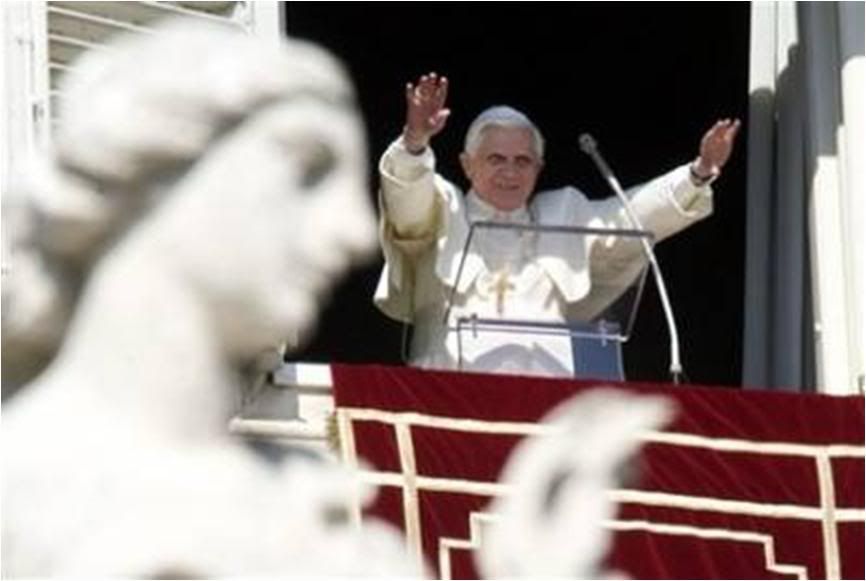 Here is a full translation of the Holy Father's words today:
Here is a full translation of the Holy Father's words today:
Dear brothers and sisters!
The Gospel page that the liturgy gives us to reflect upon on this seventh Sunday in ordinary time refers to the episode of the paralytic who was pardoned and healed (Mark 2, 1-12).
While Jesus was preaching, among the many sick persons who were brought to him was a paralytic on a stretcher. On seeing him, the Lord said: "Child, your sins are forgiven" (Mk 2,5).
And since some of those present, upon hearing his words, appeared scandalized, he added, "That you may know that the Son of Man has authority to forgive sins on earth," and to the paralytic, he said: "I say to you, rise, pick up your mat, and go home" (Mk 2,10-11). And the paralytic went away healed.
This Gospel narrative shows that Jesus has the power not only to heal the sick body, but also to forgive sins. Indeed, physical healing is a sign of the spiritual recovery that his forgiveness produces.
In effect, sin is a kind of paralysis of the spirit which only the power of God's merciful love can free us from, allowing us to rise again and resume our journey along the path of goodness.
This Sunday is also the Feast of the Chair of Peter, an important liturgical occasion that highlights the ministry of the Successor to the Prince of teh Apostles.
The Chair of Peter symbolizes the authority of the Bishop of Rome, called to carry out a unique service for the entire People of God.
Shortly after the martyrdom of Saints Peter and Paul, the primacy of the Church of Rome was recognized by the entire Catholic community, a role already attested to in the second century AD by St. Ignatius of Antioch (To the Romans, Pref.: Funk, I, 252) and by St. Irenaeus of Lyons (Against heresy III, 3, 2-3).
This singular and specific ministry of the Bishop of Rome was reaffirmed by the Second Vatican Council. We read in its dogmatic Constitution on the Church,
Within the Church particular Churches hold a rightful place; these Churches retain their own traditions, without in any way opposing the primacy of the Chair of Peter, which presides over the whole assembly of charity(cfr S. Ign. Ant', Ad Rom., Pref) and protects legitimate differences, while at the same time assuring that such differences do not hinder unity but rather contribute toward it (Lumen gentium, 13).
Dear brothers and sisters, this feast offers me the occasion to ask you to accompany me with your prayers, so that I may be able to faithfully comply with the high mission that the Divine Providence has entrusted to me as Successor to the Apostle Peter.
Let us invoke for this the Virgin Mary who, yesterday, in Rome, we celebrated under her title as Our lady of Confidence (Madonna della Fiducia).
Let us also ask her to help us enter the Lenten season with the right spiritual disposition, which will start next Wednesday with the evocative Rite of the Ashes.
May Mary open our hearts to conversion and obedient listening to the Word of God.
After the prayers, he addressed this message to GErman-speaking pilgrims:
Today is the liturgical feast of Peter's Chair that is celebrated in St. Peter's Basilica as a holiday even on Sunday.
Christ chose Peter as the Rock on which he would build his Church. As an Apostle, he had to serve the whole world - universally - as Pastor and Teacher, and this apostolic function would continue in all of his successors for all time.
Let us then ask St. Peter for his intercession that the Church may not be shaken by chaos and storms; to keep us firm in our genuine faith; to remain in unity; and to live in reciprocal love for one another.
May the Lord guide and strengthen you with his blessing.
And In English, he said:
In today’s liturgy, we witness Jesus healing the paralytic lowered to him through the roof because of a large crowd.
This passage reminds us that the Lord has the power to forgive sins, and that nothing stands in the way of his mercy when we seek him with pure and contrite hearts!
Let us never hesitate to ask his pardon – especially through the Sacrament of Reconciliation – so that we may become better instruments of his love for others. God bless you all!
 |
 01/03/2009 16:35 01/03/2009 16:35 |
|
| | | OFFLINE | | Post: 16.748 | Registrato il: 28/08/2005
| Utente Gold | |
|
ANGELUS of 3/1/09
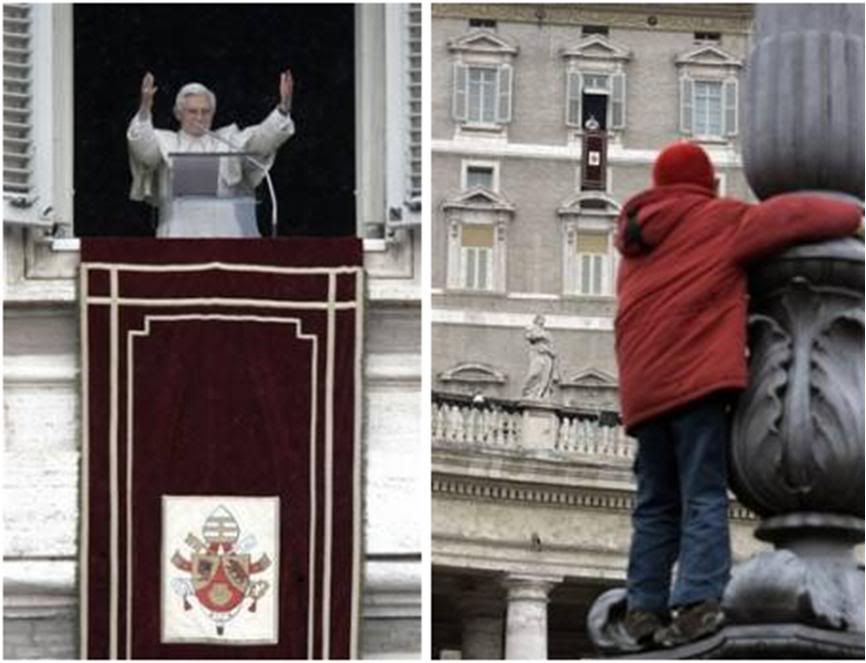 Here is a full translation of the Holy Father's words before the prayers:
Here is a full translation of the Holy Father's words before the prayers:
Dear brothers and sisters:
Today is the first Sunday of Lent, and teh Gospel, in the sober concise style of St. Mark, introduces us to the climate of this liturgical season:
"The Spirit drove Jesus out into the desert, and he remained in the desert for forty days, tempted by Satan" (Mk 1,12).
In the Holy Land, west of the river Jordan and the oasis of Jericho, the desert of Judea extends over rocky valleys (with mountains) that reach an altitude of about a thousand meters, to the edge of Jerusalem.
After having received Baptism from John, Jesus went into solitude led by the the same Holy Spirit which had descended on him, consecrating and revealing him as the Son of God.
In the desert, a place of trial, as shown by the experience of the people of Israel, the reality of kenosis, the emptying out of Christ, who stripped himself of the form of God (cfr Phil 2,6-7), is played out in vivid drama.
He, who had not sinned and cannot sin, was put to the test, and thus, he could suffer our infirmity with us (cfr Heb 6,15). He allows himself to be tempted by Satan, the adversary, who had opposed, from the beginning, God's salvific design for men.
Almost fleetingly, in the brevity of the account, against this dark and shadowy figure which dares to tempt the Lord, angels appear, luminous and mysterious figures. The angels, says the Gospel, 'ministered to' Jesus (Mk 1,13). They are the counterpoint to Satan.
'Angel' means 'a person sent', a messenger. In all the Old Testament, we find these figures, who in the name of God, help and guide men.
Let us recall the Book of Tobias, where the angel Raphael appears to assist the protagonist in so many vicissitudes.
The reassuring presence of the angel of the Lord accompanies the people of Israel in all its experiences, good and bad.
On the threshold of the New Testament, Gabriel is sent to announce to Zachariah and to Mary the happy events that are begin the story of our salvation. And an angel, whose name is not told us, advises Joseph and orients him in his time of uncertainty.
A chorus of angels brings the shepherds the good news of the birth of the Savior, just as it was angels who announced to the women of Jerusalem the joyous news of the Resurrection.
At the end of time, angels will accompany Jesus when he comes in glory (cfr Mt 25,31).
The angels ministered to Jesus, who is certainly superior to them, and this elevated status comes forth in the Gospel, proclaimed clearly though discreetly.
Indeed, even in situations of extreme poverty and humility, when he is tempted by Satan, he remains the Son of God, the Messiah, the Lord.
Dear brothers and sisters, we discard a noteworthy part of the Gospel when we set aside these beings sent by God, who announce his presence among us, and of whom they are a sign.
Let us invoke them often, so that they may support us in the task of following Jesus to the point of identifying ourselves with him.
Let us ask them today, in particular, to watch over myself and my co-workers in the Roman Curia who, this afternoon, as we do every year, will begin a week of spiritual exercises.
Mary, Queen of Angels, pray for us.
After the prayers, he said this in English:
I am happy to greet all the English-speaking visitors present at today’s Angelus prayer.
On this First Sunday of Lent, the Gospel of Saint Mark speaks of Jesus being lead into the desert by the Holy Spirit, tempted by Satan and assisted by the angels.
Let us pray that our Lenten journey will strengthen us in the struggle against all forms of temptation.
Upon all of you I invoke God’s abundant blessings, and I wish you a pleasant Sunday and a happy stay in Rome!
To the Italian-speaking pilgrims, he said:
I greet the workers of FIAT in Pomigliano d'Arco, who have come to show their concern for the future of that plant and of the thousands of persons who, directly or indirectly, depend on it for their living.
I also think of situations that are similarly difficult as those that are afflicting the territories of Sulcis-Iglesiente in Sardinia; of Prato in Tuscany; and other industrial centers in Italy and elsewhere.
I join their bishops and the respective local Churches in expressing closeness to the families affected by these problems, and I entrust them in prayer to the protection of the Most Blessed Mary and Saint Joseph, patron of workers.
I wish to express my encouragement to political and civilian authorities as well as to the entrepreneurs, so that with the concurrence of everyone, they may face this sensitive moment.
In fact, there is a need for a common and strong commitment so that priority is given to the workers and their families.
[Modificato da TERESA BENEDETTA 01/03/2009 16:37] |
 08/03/2009 17:29 08/03/2009 17:29 |
|
| | | OFFLINE | | Post: 16.784 | Registrato il: 28/08/2005
| Utente Gold | |
|
THE HOLY FATHER'S REMARKS
AT THE END OF THE WEEKLONG
LENTEN SPIRITUAL EXERCISES, 3/7/09
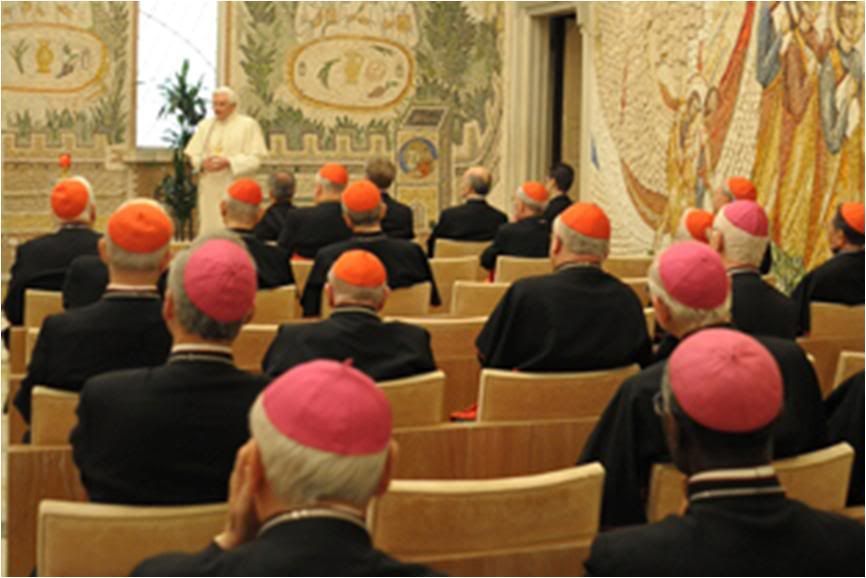
Eminences,
Dear venerated brothers:
One of the beautiful functions of a Pope is to say 'Thank you'.
At this time, I would like, in the name of all of us, to say 'Thank you" from the heart to you, Eminence, for the meditations you gave us. They have guided, illuminated and helped us to renew our priesthood.
Your meditations were no theological acrobatics. You offered us none of those, but rather a healthy doctrine, the good bread of our faith.
Listening to your words brought to mind a prophecy of Ezekiel interpreted by St. Augustine. In the Book of Ezekiel, the Lord, the God who is a shepherd, tells the people: "I will lead my sheep to the mountains of Israel, to grassy pastures."
St. Augustine asks himself what these grassy pastures would be. He answers: The mountains of Israel, the grassy pastures, are Sacred Scripture, the Word of God that gives us true nourishment.
Your preaching was permeated by Sacred Scripture, showing great familiarity with the Word of God, read in the context of the living Church, from the Fathers to the Catechism of the Catholic Church, always contextualized in (Scriptural) readings and in the liturgy.
And that is how Scripture is present in its full relevance.
Your theology, as you told us, has not been an abstract one, but characterized by healthy realism. I admired and very much appreciated your concrete experience in 50 years of priesthood that you spoke about, and in the light of which you have helped us to concretize our faith.
You have given us the right words, words that are concrete to our lives, and for our behavior as priests. I hope that many will read your words and take them to heart.
You started with the always fascinating and beautiful account of the first disciples who followed Jesus. Still rather uncertain and timid, they asked, "Master, where do you live?" And his answer - which you interpreted for us, was: "Come and see".
In order to see, we have to come along, we must walk with and follow Jesus, who always precedes us. You have shown us where Jesus lives, where his dwelling is: in his Church, in his Word, in the most Holy Eucharist.
Thank you, Eminence, for your guidance. With new impetus and new joy, let us undertake the journey towards Easter.
I wish you all a good Lent and a happy Easter.
[Modificato da TERESA BENEDETTA 08/03/2009 17:30] |
 08/03/2009 17:30 08/03/2009 17:30 |
|
| | | OFFLINE | | Post: 16.785 | Registrato il: 28/08/2005
| Utente Gold | |
|
ANGELUS OF 3/8/09
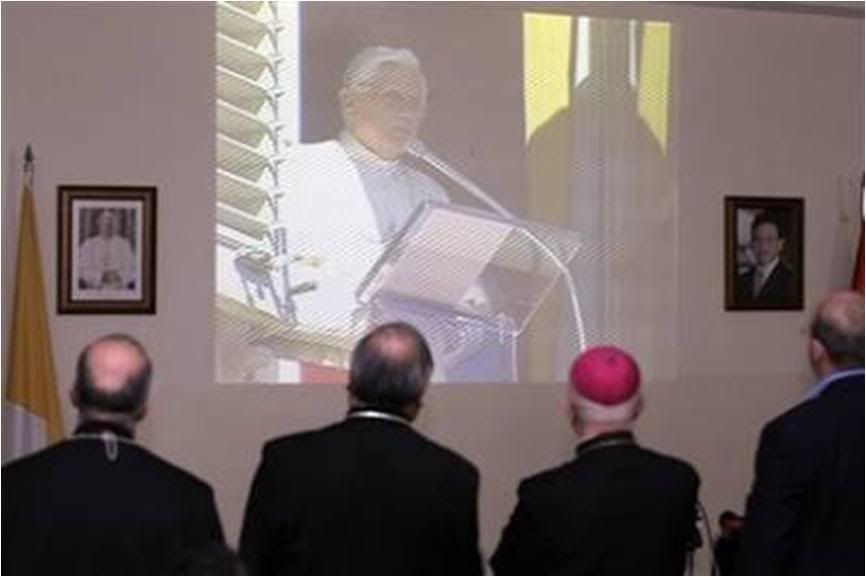 Here is a translation of the Holy Father's words at Angelus today:
Here is a translation of the Holy Father's words at Angelus today:
Dear brothers and sisters:
In the past few days, as you know, I underwent spiritual exercises along with my co-workers in the Roman Curia. It has been a week of silence and prayer: the mind and the heart could be dedicated entirely to God, listening to his Word, and meditating on the mysteries of Christ.
To some degree, it was a bit like what happened to the apostles Peter, James and John when Jesus brought them with him to a high mountain, quite apart from everyone else, and while he prayed, he was 'transfigured': his face adn his figure became luminous, resplendent.
The liturgy reminds us of this famous episode today, the second Sunday of Lent (cfr Mk 9,2-10). Jesus wished that his disciples, in particular those who would be responsible for leading the nascent Church, might have a direct experience of his divine glory to help them face the scandal of the Cross.
In effect, when the time of Jesus's betrayal would come and Jesus retreated to pray in Gethsemane, he had near him the same,e Peter, James and John, asking them to watch and pray with him (cfr Mt 26.38). They were unable to do that, but the grace of Christ would sustain them and help them to believe in the Resurrection.
I wish to underscore that the Transfiguration of Jesus was substantially an experience of prayer (cfr Lk 9,28-29). Prayer, in fact, reaches its peak - and thus becomes a source of interior light - when the spirit of man adheres to God;s and their wills merge almost as to become one.
When Jesus went up the mountain, he immersed himself in teh contemplation of the Father's plan of love in sending him to the world in order to save mankind.
Next to Jesus, there appeared Elijah and Moses, ot indicate that the Sacred Scriptures concurred in announcing the mystery of his Pasch, and that is, that the Christ must suffer and die in order to enter into his glory (cfr Lk 24,24.46).
At that moment, Jesus saw the Cross looming before him, the extreme sacrifice that was necessary to liberate us from the dominion of sin and death.
And in his heart, he repeated yet again his 'Amen'. He said 'Yes, here I am; let your will of love be done, Father '.
And as it had been after his baptism in the Jordan, the signs of pleasure from God the Father came from heaven: light, which transfigured the Christ, and the voice that proclaimed 'the beloved Son" (Mk 9,7).
Along with fasting and works of mercy, prayer forms the weight-carrying structure of our spiritual life. Dear brothers and sisters, I call on you to find during this season of Lent prolonged moments of silence, possibly of retreat, in order to see your own life in the light of the Heaven;y Father's plan of love.
Let yourselves be guided in this more intense listening to God by the Virgin Mary. teacher and model of prayer. Even in the dense darkness of the passion of Christ, she never lost the light of her divine Son but kept it in her spirit. That is why we call her Mother of trust and of hope.
After the prayers, he said the following:
On today's date, March 8, we are invited to reflect on teh condition of women and to renew the commitment that always and anywhere, every woman may be able to live and manifest the fullness of her capacities, obtaining full respect for her dignity.
In this sense, the Second Vatican Council and the papal Magisterium have expressed themselves, particularly teh apostolic letter Mulieris dignitatem by the Servant of God John Paul II (Aug. 15, 1988).
More than documents, however, are the testimonies of the saints. Our age has had that of Mother Teresa of Calcutta: a humble daughter of Albania who became, through the grace of God, an example for all the world of the exercise of charity in the service of human promotion.
How many other women work every day, unpublicized, for the good of mankind and the Kingdom of God!
Today I assure my prayers for all women that they may always be respected in their dignity and valued for their positive potential.
Dear brothers and sisters, in the climate of more intense prayer that characterizes Lent, I entrust to your remembrance in prayer teh two apostolic trips that, God willing, I will be making soon.
Next week, from March 17-23, I will go to Africa - first to Cameroon and then to Angola - to show concretely my nearness and that of the Church to the Christians and other peoples of that continent which is particularly dear to me.
Then, from May 8-15, I will make a pilgrimage to the Holy Land to invoke the Lord, while visiting the places sanctified by his earthly passage, the precious gift of unity and peace in teh Middle East and for all mankind.
I count on the spiritual support from all of you so that God may accompany and fill with his graces all those whom I will encounter on these trips.
 |
 15/03/2009 13:59 15/03/2009 13:59 |
|
| | | OFFLINE | | Post: 16.832 | Registrato il: 28/08/2005
| Utente Gold | |
|
ANGELUS OF 3/15/09
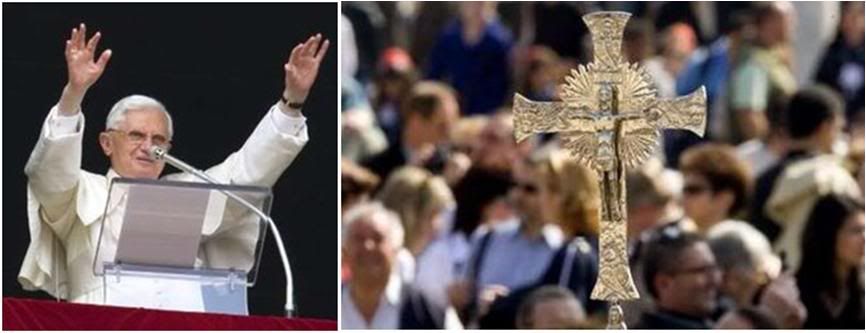 Here is a full translation of the Holy Father's words at the Angelus today:
Here is a full translation of the Holy Father's words at the Angelus today:
Dear brothers and sisters!
From Tuesday, March 17, to Monday, March 23, I will be making my first apostolic trip to Africa.
I will be going to Cameroon, in its capital Yaounde, to deliver the 'Working Instrument' of the Second Special Assembly for Africa of teh Bishops' Synod which will take place in October here at the Vatican.
I will then proceed to Luanda, capital of Angola, a nation which after a long civil war, has found peace and is now called to reconstruct itself in justice.
With this visit, I intend to embrace ideally the entire African continent - its thousand differences and its profound religious spirit; its ancient cultures and its laborious path of development adn reconciliation; its serious problems, its serious problems, its painful wounds and its enormous potential and hopes.
I intend to confirm African Catholics in their faith, encourage Christians in the ecumenical commitment, and bring to everyone the announcement of peace entrusted to the Church by the Risen Christ.
While I prepare myself for this missionary voyage, the words of the Apostle Paul resound in my soul, as the liturgy proposes for our meditation on this third Sunday of lent: "We proclaim Christ crucified, a stumbling block to Jews and foolishness to Gentiles; but to those who are called, Jews and Greeks alike, Christ the power of God and the wisdom of God" (1 Cor 1,23-24).
Yes, dear brothers and sisters, I leave for Africa, knowing that I have nothing to propose and to give to those I will meet but Christ and the Good News of his Cross, mystery of supreme love, of divine love that conquers every human resistance and makes possible even forgiveness and love for one's enemies.
This is the grace of the Gospel that is capable of transforming the world. This is the grace that can renew even Africa, because it generates an irresistible force of peace and of profound and radical reconciliation.
The Church does not pursue economic, social and political objectives. The Church announces Christ, certain that the Gospel can touch the hearts of everyone and transform them, thus renewing from within the person and society.
On March 19, during my pastoral visit in Africa, we will be celebrating the solemnity of St. Joseph, patron of teh universal Church - as well as mine, as you know.
St. Joseph, advised in a dream by an angel, had to flee with Mary to Egypt, in Africa, to keep the newborn Jesus safe from Herod who wanted to kill him.
And thus the Scriptures came to pass: Jesus followed the footsteps of the ancient Jewish patriarchs, and then, like the people of Israel, returned to the Promised Land after an exile in Egypt.
To the celestial intercession of this great saint, I entrust my coming pilgrimage and the people of all Africa, along with the challenges that mark them and the hopes that animate them.
In particular, I think of the victims of hunger and disease, of injustices, the fratricidal conflicts and every form of violence that, unfortunately, continues to strike at adults and children, and does not spare missionaries, priests, religious and volunteers.
Brothers and sisters, be with me on this trip with your prayers, invoking Mary, Mother and Queen of Africa.
After the prayers, he said this:
This morning the Pauline Jubilee celebrations of university students ended at the Basilica of St. Paul outside the Walls.
The students' celebration was promoted by the Congregation for Catholic Education and by the Pontifical Council on Culture, and organized by teh Vicariate of Rome, with the theme "'That which you adore without knowing, I announce to you': Gospel and culture for a new humanism".
UI am very happy for the presence in Rome of distinguished professors and delegates of various university pastoral ministries from all the continents.
This event constitutes an important phase in the always-lively dialog between the Church and the university. I hope that a pastoral ministry for universities may develop in all the local Churches for the formation of the youth and to elaborate a culture inspired by the Gospel.
Dear university students, I encourage you and am with you in prayer.
Later, he said in English:
As we continue our Lenten journey may our resolve to follow Jesus be strengthened through prayer, forgiveness, fasting and assistance to those in need.
This Tuesday, I leave Rome for my visit to Cameroon and Angola. My presence in the great Continent of Africa forms part of the preparation for the Special Assembly of the Synod of Bishops dedicated to the theme: "The Church in Africa in Service to Reconciliation, Justice and Peace".
I ask each of you to join me in praying that my visit will be a time of spiritual renewal for all Africans and an occasion in which civic and religious leaders will strengthen their resolve to walk the path of justice, integrity and compassion. May the lives of African men, women and children be transformed in hope!
Upon all of you gathered and your loved ones, I gladly invoke the strength and peace of Christ the Lord.
 |
 29/03/2009 22:05 29/03/2009 22:05 |
|
| | | OFFLINE | | Post: 16.995 | Registrato il: 28/08/2005
| Utente Gold | |
|
HOMILY OF 3/29/09
FIFTH SUNDAY OF LENT
Pastoral Visit to the Parish of
SANTO VOLOTO DI GESU (HOLY FACE OF JESUS)
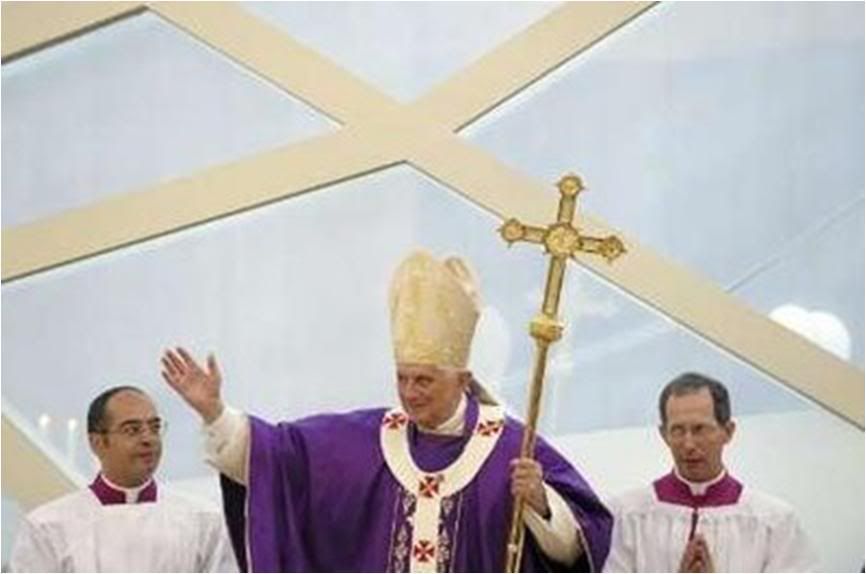
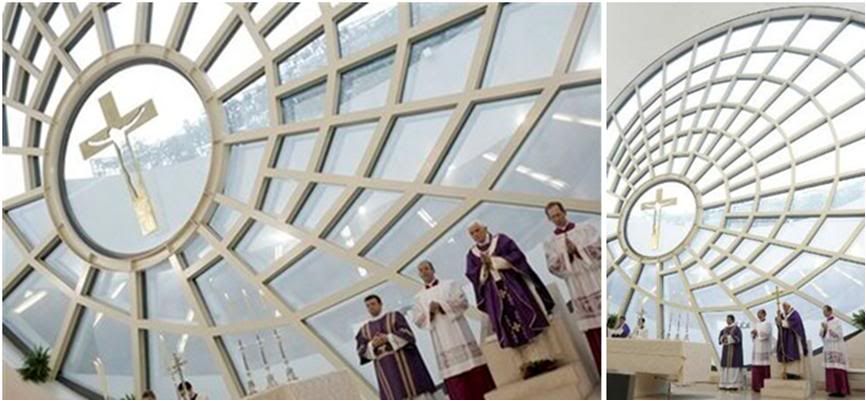 Here is a translation of the Holy Father's homily today:
Here is a translation of the Holy Father's homily today:
Dear brothers and sisters,
In today's Gospel, St. John recounts an episode that took place in the last stage of the public life of Jesus, with the Jewish Passover imminent, which would be the Passover of death and resurrection.
When he was in Jerusalem, the Evangelist tells us, some Greeks, converted from Judaism, were curious about him and attracted by what he had been doing. They approached Phillip, one of the Twelve Apostles, who had a Greek name but was from Galilee. "Sir," they said, "we would like to see Jesus".
Phillip in turn called Andrew, one of the first apostles who was very close to Jesus - he too had a Greek name - and both of them "went and told Jesus" (cfr Jn 12,20-21).
In teh request by these anonymous Greeks, we can read the thirst that is in the heart of every man to see and to know Christ. And the response of Jesus orients us to the mystery of Easter, the glorious manifestation of his salvific mission.
"The hour has come", he said, "for the Son of Man to be glorified" (Jn 12, 23). Yes, the hour of the glorification of the Son of Man is about to come, but this will require a sorrowful transition through his Passion and death on the Cross.
Indeed, only that way could the divine plan of salvation be realized, which is for everyone, Jews and Greeks, Jews and pagans. All are invited to be part of the one people of the new and definitive alliance.
In this light, we can also understand the solemn proclamation that concludes this Gospel passage: "And when I am lifted up from the earth, I will draw everyone to myself" (Jn 12,32), as well as the Evangelist's comment: "He said this ,indicating the kind of death he would die" (Jn 12,33).
The cross, which is the height of love, is the measure of Christ, and this measure attracts everyone.
Very opportunely, the liturgy makes us meditate on this text of the Gospel of John on this fifth Sunday of Lent, when the days of the Lord's Passion are drawing near, in which we shall immerse ourselves spiritually starting next Sunday, appropriately called the Sunday of the Palms and of the Passion of our Lord.
It is as if the Church is stimulating us to share in Jesus's state of mind, to prepare us to relive the Mystery of his crucifixion, death and resurrection, not as extraneous spectators, but as protagonists along with him, involved in the mystery of the Cross and the Resurrection.
Where Christ is, there his disciples should be, who are called to follow him, to be one with him at the moment of struggle, in order to be co-participants in his triumph.
Then, what does our association with his mission consist of? The Lord himself explains it. Speaking of his coming glorious death, he uses - as we heard - a simple image that is also very suggestive: "Unless a grain of wheat falls to the ground and dies, it remains just a grain of wheat, but if it dies, it produces much fruit" (Jn 12,24).
Thus, Jesus compares himself to 'a grain of wheat that dies in order to bring much fruit to everyone", according to an effective saying by St. Athanasius. It is only through death that the Cross has borne much fruit through the centuries.
It was not enough that the Son of Man was incarnated. In order to bring to completion the divine plan of universal salvation, it was necessary that he be killed and buried, and that way, all of human reality is accepted in his death, and his resurrection would make manifest the triumph of Life, because it was the triumph of his love. And thus he shows that love, and love alone, is stronger than death.
And yet, the man Jesus was a true man, with our feelings, and he felt the weight of the ordeal as well as bitter sorrow over the tragic end that awaited him. Precisely by being man, God felt all the more the abyss of terror, which is also the abyss of human sin, of everything that is filthy in man, which he had to carry with him and transfer over to his love.
"I am troubled now," he confesses, "yet what would I say? 'Father, save me from this hour?'" (Jn 12,27). Almost there is the temptation to ask "Save me, do not allow the Cross, give me life".
We grasp from this sorrowful invocation of his an anticipation of the agonized prayer in Gethsemane, when, experiencing the drama of solitude and fear, he would implore the Father to take away the chalice of passion.
But at the same time, his filial adherence to the divine plan never failed, because he knew "it was for this purpose that i came to this hour" and he prays with trust: "Father, glorify your name" (Jn 12,28). This means, "I accept the Cross", on which the name of God is glorified, that is, the greatness of his love. And it also anticipates the words on the Mount of Olives: "Not my will but yours".
He transforms his human will and identifies it with the divine will. This is the great process on the Mount of Olives, that which should be realized in every prayer we make: to transform our selfish will, to allow it to be transformed, to open it up so that it may be transformed to the divine will.
The same sentiments emerge in the passage from the Letter to the Hebrews, proclaimed in today's Second Reading. Prostrated by extreme anguish because of the death that hangs over him, Jesus offers to God - the letter says - prayers and supplications "with loud cries and tears" (Heb 5,7).
He asks the help of Him who could save him, while always abandoning himself in the hands of the Father. For this filial trust in God, the author notes, his wish was granted, in the sense that he was resurrected, that he received the new and definitive life.
The Letter to the Hebrews makes us understand that his insistent prayers, offered with loud cries and tears, was the very act of the Supreme High Priest offering himself and mankind to the Father, thus transforming the world.
Dear brothers and sisters, this is the demanding way of the Cross which Jesus indicates to all his disciples. Several times he said, "Whoever serves me must follow me". There is no alternative for the Christian who wants to realize his calling.
It is the 'law' of the Cross described with the image of the grain of wheat that dies in order to sprout to new life. It is the 'logic' of the Cross recalled in today's Gospel: "Whoever loves his life loses it, and whoever hates life in this world will preserve it for eternal life".
"To hate" one's life was a strong and paradoxical Jewish expression which underscores the radical totality that should distinguish him who follows Christ and places himself, for love of him, at the service of his brothers. He loses his life and thus finds it. There is no other way to experience the joy and true fecundity of Love, which is giving oneself, losing oneself in order to find oneself.
Dear friends, Jesus's invitation resounds perticularly eloquent in the celebration today in your parish. It is dedicated to the Holy Face of Jesus: that Face which 'some Greeks', the Gospel tells us, wanted to see; that Face which in the coming days of the Passion, we shall contemplate disfigured because of man's sins, indifference and ingratitude; that Face radiant with light and blazing with glory, which will shine forth on Easter dawn.
Let us keep our heart and mind focused on the Face of Christ, dear faithful, whom I greet affectionately, starting with your parish priest, Don Luigi Coluzzi, to whom I am also grateful for having conveyed your sentiments.
Thank you for your cordial welcome. I am truly happy to find myself among you on the occasion of the third anniversary of the dedication of your church, and I salute everyone with affection.
I address a special greeting to the Cardinal Vicar (Agostino Vallini); to Cardinal Fiorenzo Angelini, who contributed to the realization of this new parochial complex; to the Auxiliary Bishop of the sector and other prelates present; His Excellency Mons. Costalunga; the priests and other parish workers; to the meritorious nuns of the Congregation of the Poor Daughters of the Visitation, who have their Rest Home for the Aged right in front of this beautiful church.
I greet the catechists, the Parish Council and all pastoral workers and those who work together in the daily life of the parish. I greet the children, young people and families. And I extend my greeting to all the inhabitants of Magliana, especially the aged, the sick, those who are alone and in difficulty. I assure for everyone my prayers at this Holy Mass. [APPLAUSE]
Dear brothers and sisters, allow yourselves to be enlightened by the splendor of the Face of Christ, so that your young community - which can avail of the new parish complex that is modern in its structure and functioning - will walk united, in the common commitment to announce and bear witness to the Gospel in this district.
I know how much attention you are giving to liturgical formation, making full use of every resource in your community - readers, the choir, and all who are involved in animating the celebrations. It is important that prayer, personal as well as liturgical, always occupies first place in your lives.
I know the commitment which you devote to catecheses, so that it may respond to the expectations of young people - those who are preparing themselves to receive the sacraments of First Communion and of Confirmation, as well as those who often frequent the oratory.
Concern yourself as well with assuring a catechesis that is adapted to their parents, whom you should invite to follow a course of Christian formation along with their children, Thus you will help families to live together through the sacramental appointments, educating them in the faith 'within the family', which should be the first and natural 'school' of Christian life for all its members.
I rejoice with you that your parish is open and welcoming, animated and made lively by a sincere love of God and all your brothers, in imitation of St. Maximilian Kolbe, to whom the parish was originally dedicated.As you know, in Auschwitz, he sacrificed himself with heroic courage to save the life of others.
In this our time, which is marked by a general social and economic crisis, your efforts are very meriotorious, through the parish
Caritas and the Sant'Egidio group, to meet as far as possible the needs of the poorest and the most needy.
I want to reserve a special encouragement to you, dear young people. Let yourself be drawn into the fascination of Christ. With the eyes of faith, look at his Face and ask him, "Jesus, what do you want me to do with you and for you?"
Be attentive and listen, and guided by his Spirit, follow the plan that he has for you. Prepare yourselves seriously to build united families that are faithful to the Gospel and to be its witnesses in society which needs these testimony.
And if the Lord calls you, be ready to dedicate your existence completely to his service in the Church as priests, or as religious men and wome., I assure you of my prayers.
In particular, I expect you on Thursday at St. Peter's Basilica where we will prepare ourselves for World Youth Day which, as you know, is celebrated this year on the diocesan level next Sunday.
We will remember together my beloved and venerated predecessor, the servant of God, Pope John p[aul II, on the fourth anniversary of his death. On many occasions, he encouraged young people to meet Christ and follow him with enthusiasm and generosity.
Dear brothers and sisters of this parish community, may the infinite love of Christ which shines forth from his Face be reflected in your every attitude and become your 'day to day'.
St. Augustine exhorted in a paschal homily: "Christ suffered; we die to sin. Christ rose again; we live for God. Christ has gone from this world to the Father; let not our hearts stay behind but follow him above. Our leader was hung on the Cross; let us crucify the concupiscence of the flesh. He lies in the sepulchre; entombed with him, let us forget the things of the past. He sits in heaven; let us transfer our desires to the supreme things" (S. Augustine, Discourses 229/D, 1).
Inspired by this awareness, let us proceed with the Eucharistic celebration, invoking the maternal intercession of Mary, so that our existence may become a reflection of that of Jesus.
Let us pray so that all whom we meet may always perceive in our acts and words the pacifying and comforting goodness of his Face. Amen.
 |
 29/03/2009 22:07 29/03/2009 22:07 |
|
| | | OFFLINE | | Post: 16.996 | Registrato il: 28/08/2005
| Utente Gold | |
|
ANGELUS OF 3/29/09
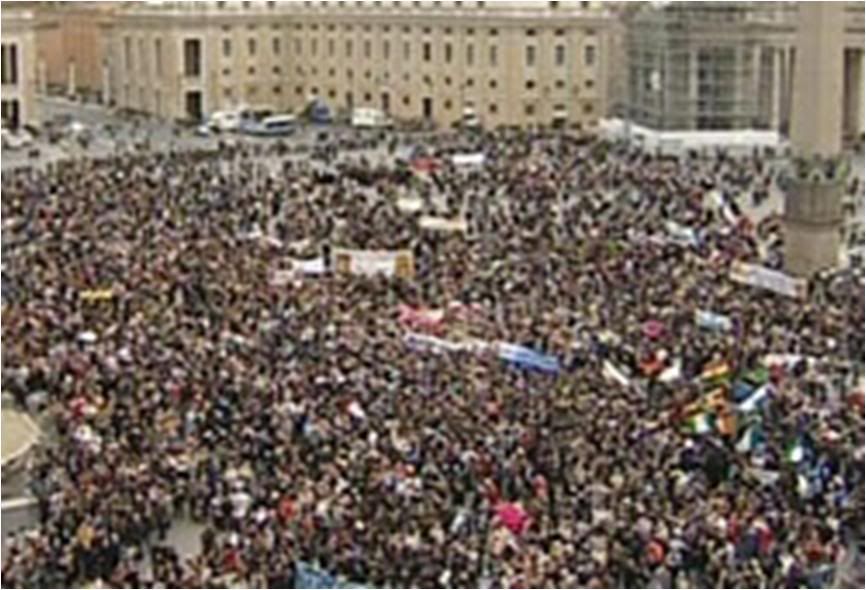
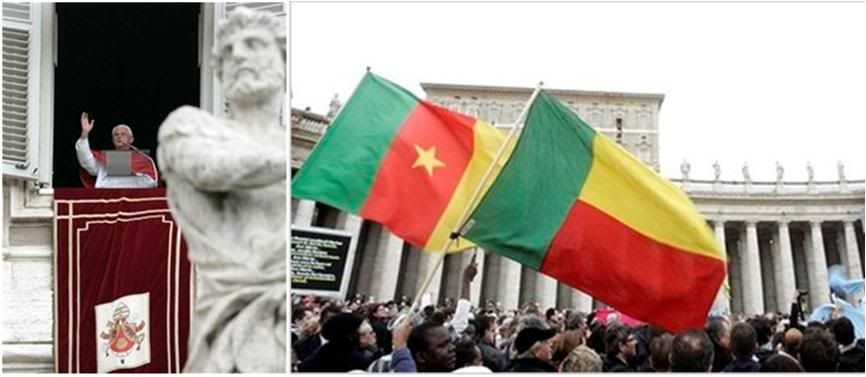 Here is a translation of the Holy Father's words at Angelus today:
Here is a translation of the Holy Father's words at Angelus today:
Dear brothers and sisters!
First I wish to thank God and all those who, in various ways, worked together for the success of the apostolic trip that I was able to make to Africa in recent days, and I invoke on all the seeds spread throughout African soil the abundance of heavenly blessings.
I will speak more about this significant pastoral experience at the General Audience on Wednesday, but I cannot miss this occasion to manifest the profound emotion I experienced in meeting the Catholic communities and peoples of Cameroon and Angola.
What struck me most were two aspects, both of them very important. The first is the joy that is visible in the faces of the people - the joy of feeling oneself part of the one family of God - and I thank the Lord for having allowed me to share with those brothers and sisters of ours moments of simple celebration, which was unanimous and full of faith.
The second aspect was the sense of the sacred that one could breathe during the liturgical celebrations - a characteristic that is common to all the peoples of Africa, and which emerged, I can say, at every moment of my sojourn with those dear peoples.
The visit allowed me to see and understand better the reality of the Church in Africa in the variety of its experiences and the challenges that have to be faced at this time.
Precisely in thinking about the challenges that mark the Church's journey on the African continent, and in every other part of the world, we note how actual the words of the Gospel are today on this fifth Sunday of Lent.
Jesus, with his passion imminent, says: "Unless a grain of wheat falls to the ground and dies, it remains just a grain of wheat;
but if it dies, it produces much fruit" (Jn 12,24).
It was now a time not for words and discourses: the decisive hour had come, for which the Son of God had come to the world, and even if his soul was much perturbed, he made himself willing to complete to its very end the will of the Father.
This is the will of God: to give eternal life to us who have lost it. But in order to realize this, it was necessary that Jesus should die, like a grain of wheat that God the Father had sown in the world.
Indeed, only that way could a new humanity sprout and grow, free of the dominion of sin and able to live in brotherhood, as sons and daughters of the one Father who is in heaven.
In the great feast of faith that people live together in Africa, we experienced how this new humanity is alive, even with its human limitations. There, where missionaries, like Jesus, have given adn continue to give their lives for the Gospel, abundant fruit is being harvested.
I wish to address to them a special thought of gratitude for all the good they are doing. They are priests, religious men and women, and lay men and women. I found it beautiful to see the fruit of their love for Christ and to feel the profound gratitude that Christians have for them.
Let us give thanks to God, and let us pray to the Most Blessed Virgin so that Christ's message of hope and love may be spread throughout the world.
After the Angelus, he said this:
With great affection, I greet the numerous Africans who live in Rome, among them many students, who are accompanied today by Mons. Robert Sarah, secretary of the Congregation for the Evangelization of Peoples.
Dearest ones, you have come to show your joy and acknowledgment of my apostolic trip to Africa. I thank you from the heart. I am praying for you, for your families and for your countries of origin. Thank you!
On Thursday, at 6 p.m., I will preside at Holy Mass in St. Peter's Basilica to mark the fourth anniversary of the death of my beloved predecessor, the Servant of God John Paul II.
I invite the youth of Rome, particularly, to participate, so that together we may prepare for World Youth Day which will be celebrated on the diocesan level on Palm Sunday.
In English, he said:
I am pleased to welcome all the English-speaking pilgrims to this Angelus, especially students and teachers from Holy Trinity Catholic High School in Edmonton, Canada.
In today’s liturgy, Jesus teaches that "unless a grain of wheat falls to the ground and dies, it remains just a grain of wheat; but if it dies, it produces much fruit".
In these final weeks of Lent, let us intensify our prayer, fasting and almsgiving. In this way, we will prepare ourselves to meditate on Christ’s passion and death, so as to rejoice fully in the glory of his Resurrection.
God bless you all!
 |
 04/04/2009 01:26 04/04/2009 01:26 |
|
| | | OFFLINE | | Post: 17.046 | Registrato il: 28/08/2005
| Utente Gold | |
|
HOMILY AT MEMORIAL MASS
FOR JOHN PAUL II, 4/2/09
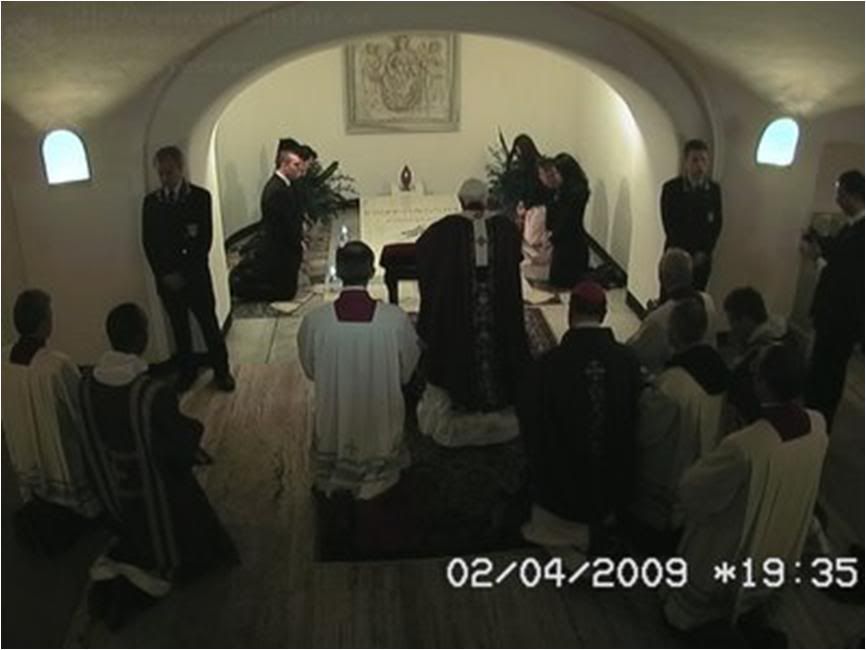 Pope Benedict greets Sr. Tobiana, the Polish nun who nursed John Paul II to the very end.
Pope Benedict greets Sr. Tobiana, the Polish nun who nursed John Paul II to the very end.
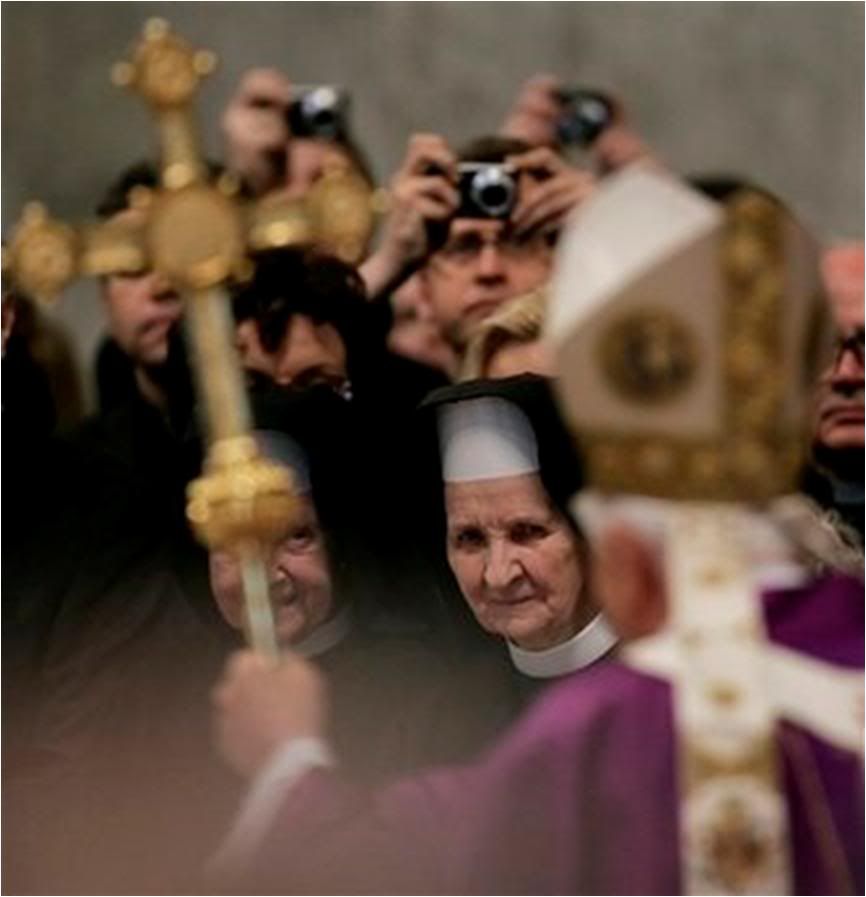
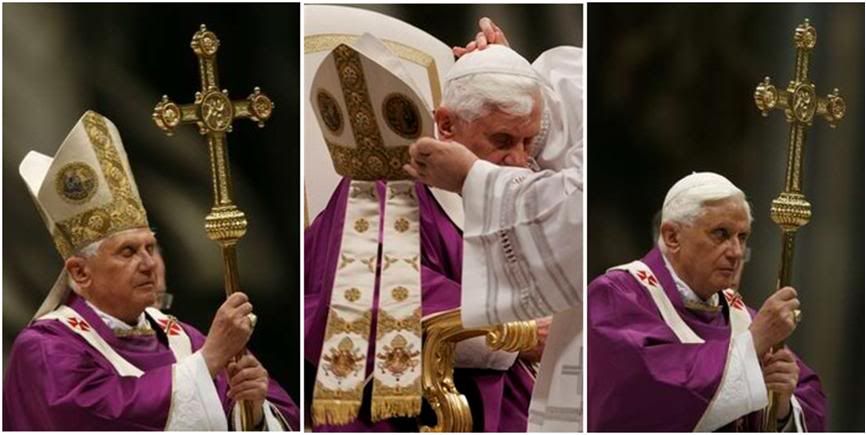 Here is a translation of the Holy Father's homily:
Here is a translation of the Holy Father's homily:
Dear brothers and sisters!
Four years ago, on this day, my beloved predecessor, the Servant of God John Paul II, ended his earthly pilgrimage after a none-too-brief period of great suffering.
We are celebrating the Holy Eucharist in memory of his soul, even as we thank the Lord for having given him to the Church for so many years as her zealous and generous pastor.
His memory reunites us this evening, a memory that remains vivid in the hearts of men, as we see in the uninterrupted pilgrimage of faithful to his tomb in the Vatican Grottoes.
It is thus with emotion and joy that I preside at this Holy Mass, even as I thank you, venerated brothers in the episcopate and priesthood, and you the faithful, coming from all parts of the world, especially from Poland, for this significant occasion.
He then said the following in Polish (translated from the Italian):
I wish to greet the Poles, particularly the Polish youth. On this fourth anniversary of the death of John Paul II, heed his appeal: "Do not be afraid to entrust yourself to Christ. He will lead you and give you the strength to face every day in every situation" (Tor Vergata, Prayer Vigil, WYD 2000, 8/19/00).
I hope that this thought from the Servant of God will lead you along the pathways of your life and to the joy of the morning of the Resurrection.
He resumed in Italian:
I greet the Cardinal Vicar, the Cardinal Archbishop of Cracow - dear Cardinal Stanislaw - and the other cardinals and prelates here. I greet the priests and the religious.
And I greet you, beloved young people of Rome, who with this celebration, are preparing yourselves for the coming World Youth Day which we will mark together on Sunday, Palm Sunday.
Your presence recalls the enthusiasm that John Paul II knew how to instill in the new generations. May his memory stimulate all of us, gathered in this Basilica where, on countless occasions he celebrated the Eucharist, allowing ourselves to be enlightened and interpellated by the Word of God that was just proclaimed.
The Gospel on this Thursday of the fifth week of Lent offers for our meditation the last part of Chapter 8 in the Gospel of John, which contains - as we heard - a long dispute over the identity of Jesus.
Earlier, he had presented himself as 'the light of the world' (v 12), also using three times (verses 23, 28, 58) the expression, I AM, which recalls strongly the name of God revealed to Moses (cfr Ez 3,14). And he added, "Whoever keeps my word will never taste death" (v 51), thus declaring that he was sent by God, his Father, to bring to men a radical liberation from sin and death, which is indispensable for entering into eternal life.
But his words wounded the pride of his listeners, and even his reference to the great patriarch Abraham became a reason for conflict. "Amen, amen, I say to you, before Abraham came to be, I AM" (8,58).
In no uncertain terms, he declares his pre-existence and therefore his superiority to Abraham, understandably arousing the scandalized reaction of the Jews.
But Jesus could not be silent about his identity; he knew that, in the end, the Father himself would prove him right, glorifying him in death and resurrection, because when he was be raised on the Cross, he would be revealed as the only-begotten Son of God (cfr Jn 8,28; Mk 15,59).
Dear friends, meditating on this page of John's Gospel, we spontaneously consider how difficult it truly is to bear witness to Christ. And our thoughts go to the beloved Servant of God Karol Wojtyla, John Paul II, who even as a boy, showed himself to be an intrepid and ardent defender of Christ.
For Christ, he did not hesitate to exert every effort to spread his light everywhere. He refused to descend to compromises when it came to proclaiming and defending his truth. He never tired of spreading his love.
From the beginning of his pontificate up to April 2, 2005, he had no fear of proclaiming, to everyone and all the time, that Jesus alone is the Savior and true Liberator of mankind and of the whole man.
In the first Reading, we heard God's words to Abraham: "I will render you exceedingly fertile" (Gen 17,6). If testifying to one's adherence to the Gospel is never easy, the certainty that God renders our effort fertile, when it is sincere and generous, is comforting.
Even from this point of view, the spiritual experience of the Servant of God John Paul II appears significant to us. Looking at his existence, we see how the promise of fecundity made by God to Abraham - echoed in the First Reading taken from Genesis - was realized in him.
We can say that, especially during the years of his long Pontificate, he generated so many sons and daughters in the faith, of which you are the visible signs, dear young people who are here tonight: you, the youth of Rome, and you, the young people who have come from Sydney and Madrid, to represent ideally the ranks of girls and boys, young women and men, who have participated in 23 previous World Youth Days, many of them held in various parts of the world.
How many vocations to the priesthood and the consecrated life, how many young families determined to live the evangelical life and to strive for saintliness, are linked to the testimony and to the preaching of my venerated predecessor!
How many boys and girls, young men and women, have been converted, or have persevered in their Christian way, thanks to his prayers, his encouragement, his support and his example!
How true it is that John Paul II succeeded in communicating a strong charge of hope, based on faith in Jesus Christ, which is "the same yesterday, today and for always" (Heb 13,8), which was the motto of the Great Jubilee of 2000!
As an affectionate father and an attentive educator, he gave and firm reference points that were indispensable for everyone, especially for the youth.
And at the time of his agony and death, this new generation wanted to show him it understood his teaching, gathering silently in prayer at St. Peter's Square and in so many other places around the world.
The youth felt that his departure would be a loss: 'their' Papa was dying, he whom they considered 'their father' in the faith. But they also realized at the same time that he left them his courage and the consistency of his testimony as a legacy.
Had he not underscored so many times the need for a radical adherence to the Gospel, exhorting adults and young people alike to take this common educative responsibility seriously?
As you know, I have taken up his concerns, speaking on various occasions of the educative emergency today that involves families, the Church, society, and especially, the new generations.
During their growth period, children need adults who are able to give them principles and values - and they recognize the need for persons who can teach them with their lives, not only with words, to exert themselves for higher ideals.
But where to draw light and knowledge in order to fulfill this mission, which involves us all, in the Church and in society? Certainly, it is not enough to call on human resources: one must - and in the first place - entrust oneself to divine aid.
"The Lord remembers his covenant forever", we prayed just now in the Responsorial Psalm, certain that God will never abandon those who remain faithful to him.
This recalls to us the theme for the 24th World Youth Day, which will be celebrated on the diocesan level this Sunday. It is taken from St. Paul's first Letter to Timothy: "We have placed our hope in the living God" (4,10).
The Apostle was speaking for the Christian community, for those who believe in Christ and are different from 'others who do not have hope' (1 Tm 4,13), precisely because they have hope, they have trust in the future, a trust not based on human ideas or provisions, but on God, 'the living God'.
Dear young people, once cannot live without hope. Experience shows that everything - our life itself - is at risk and can crumble for any reason, which can be internal or external to us, and at any moment. It is normal: everything that is human, and therefore even hope, does not have a basis in itself, but needs a 'rock' to be anchored on.
That is why Paul wrote that Christians are called upon to base Christian hope on the 'living God'. Only in him and with him does hope become certain and reliable. Indeed, only God, who in Jesus Christ revealed to us the fullness of his love, can be our firm hope. In him, our hope, we are saved indeed! (cfr Rm 8,24).
But take heed: in moments like this, given the cultural and social context in which we live, the risk of reducing Christian hope to ideology, to group slogans and to exterior trappings, can also be stronger.
Nothing is more contrary to the message of Jesus: He does not want his disciples to 'play' a part, even if it is that of hope. He wants them to 'be' hope itself, and they can be so, only if they stay united with him.
He wants each of you, dear young friends, to be a small spring of hope for your neighbor, so that everyone together may be an oasis of hope for the society in which you find yourselves.
Now, this is possible on one condition: that you live of him and in him, through prayer and the Sacraments, as I wrote in the message for this year. If Christ's words remain in us, we can propagate the flame of that love which he lit on earth; we can raise high the torch of faith and hope with which we advance towards him, while we await his glorious return at the end of times.
It is the torch that Pope John Paul II has left us as a legacy. He also turned it over to me, as his successor; and tonight, I hand it over once again to you ideally; and in a special way, to you, the young people of Rome, so that you may continue to be sentinels of the morning, watchful and joyous in this dawn of the third millennium.
Respond generously to the call of Christ. In particular, during the Year of the Priest which begins on June 19, make yourselves available, if Jesus calls you, to follow him on the way of priesthood and the consecrated life.
"Now is the right moment; today is the day of salvation". The liturgy has exhorted us to renew now - and every moment is 'the right time' - our determination to follow Christ, certain that he is our salvation.
This, fundamentally, is the message that our dear Pope John Paul II repeats to us tonight. While we entrust his elected soul to the maternal intercession of the Virgin Mary whom he always loved tenderly, we hope that from heaven, he will not cease to be with us and to intercede for us.
May he help each of us to live as he did, repeating to God, day after day, through Mary, with full confidence: Totus tuus! Amen.
 |
 26/04/2009 19:11 26/04/2009 19:11 |
|
| | | OFFLINE | | Post: 17.230 | Registrato il: 28/08/2005
| Utente Gold | |
|
HOMILY FOR PALM SUNDAY
and the XXIV WORLD YOUTH DAY, 4/6/09
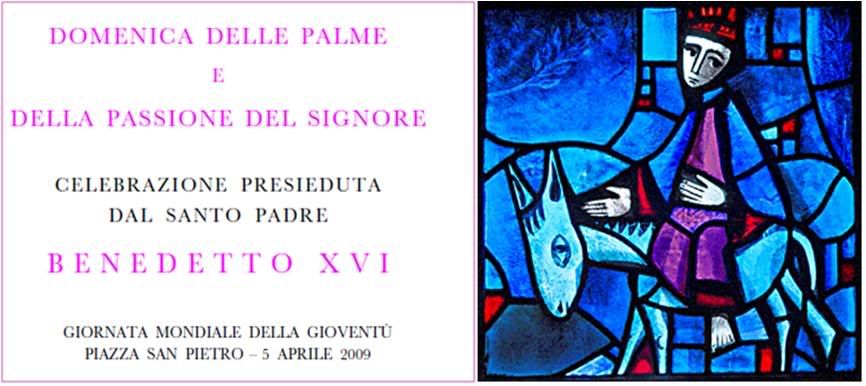
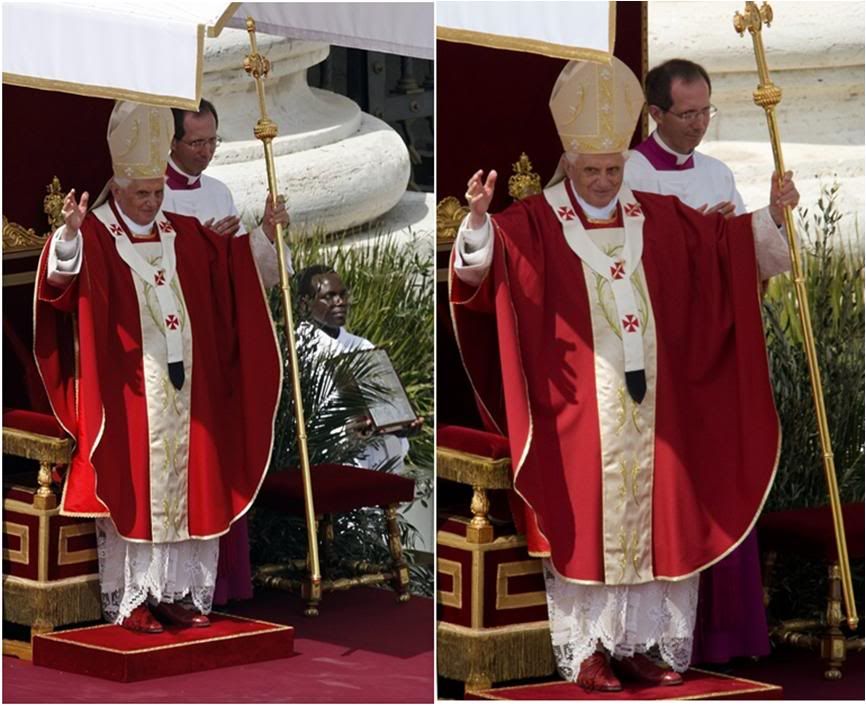
Dear brothers and sisters,
dear young people!
Together with growing ranks of pilgrims, Jesus went up to Jerusalem for the Passover.
In the last stage of the journey, near Jericho, he healed the blind man Bartimaeus who had invoked him as Son of David, asking for help. And now, able to see, he joined the crowd of pilgrims in gratitude.
When, at the gates of Jerusalem, Jesus mounted a donkey - the animal symbolic of David's kingship - the pilgrims spontaneously broke out with the joyous certainty: "It is him, the Son of David!"
And so they hailed Jesus with the Messianic acclamation: "Blessed is he who comes in the name of the Lord!", adding, "Blessed is the kingdom of our father David that is to come! Hosanna in the highest!" (Mk 11,9f).
We don't know exactly what the enthusiastic pilgrims thought the coming Kingdom of David would be. And we, have we truly understood the message of Jesus, Son of David? Have we understood what the Kingdom is that he spoke of when he was questioned by Pilate? Do we understand what it means that this Kingdom is not of this world? Or do we perhaps wish that it should be of this world?
St. John, in his Gospel, after the account of the entry into Jerusalem, reports a series of statements by Jesus in which he explains the essentials of this new kind of Kingdom.
At a first reading of these texts, we can distinguish three different images of the Kingdom \in which the same mystery is reflected in different ways.
John recounts first of all that among the pilgrims who, during the feast, 'wished to adore God", there were also some Greeks (cfr 12,20). Let us take note that the true objective of these pilgrims was to adore God. This corresponds perfectly to what Jesus said on the occasion of the purification of the temple: "'My house shall be called a house of prayer for all peoples" OMk 11,17).
The true objective of pilgrimage should be to encounter God, to adore him, and thereby place the basic relationship in our life in its correct order.
The Greeks were in search of God - with their lives, they were on a journey toward God. Now, through two Greek-speaking apostles, Philip and Andrew, they sent on their message to the Lord, "We would like to see Jesus" (Jn 12,21). A great statement.
Dear friends, that is why we are gathered here: We want to see Jesus. For this reason, last year, thousands of young people went to Sydney. Certainly, they must have had multiple expectations for that pilgrimage. But the essential objective was this - "We want to see Jesus".
About the request, what did Jesus say and do at that time? It is not clear from the Gospel whether the Greeks did get to meet Jesus. Jesus's regard goes far beyond.
The nucleus of his response to the request was: "Unless a grain of wheat falls to the ground and dies, it remains just a grain of wheat; but if it dies, it produces much fruit" (Jn 12,24).
This means: it is not important now to have a conversation that's more or less brief with a few persons who will then return home. Like a grain of wheat that dies and rises again, I will return, in a totally different way and beyond the limits of this moment. I will meet the world and the Greeks.
Through the Resurrection, Jesus goes beyond the limits of space and time. As the Risen One, he is on the way towards the vastness of the world and of history. And yes, as the Risen One, he will go to the Greeks and speak with them, he will show them himself so that they, who were remote, become near, and his Word will come to them in a new way, in their own language, their culture, and will be understood in a new way - his Kingdom will come.
Thus we can recognize two essential characteristics of this Kingdom. The first is that this Kingdom comes by way of the Cross. Since Jesus gives himself totally, as the Risen One, he can belong to everyone and make himself present to everyone.
In the Holy Eucharist, we receive the fruit of the dead grain of wheat, the multiplication of loaves which will continue to the end of teh world and for all time.
The second characteristic is that the Kingdom is universal. Israel's ancient hope is fulfilled: this kingship of David no longer has boundaries. It extends 'from sea to sea' - as the prophet Zachariah says (9,10) - that is, it embraces the whole world.
However, this is only possible because it is not the kingship of a political power, but is based only on the free adherence to love - a love which responds to the love of Jesus who gave himself for everyone.
I think we must always learn both things anew - above all, the universality, the catholicity of the Kingdom of God. It means that no one can set himself as the absolute, not his culture, his time and his world. This requires that we must all accommodate each other, renouncing something of ourselves.
Universality includes the mystery of the Cross - overcoming oneself, obedience to the common world of Jesus Christ in our common Church. Universality is always overcoming the self, renouncing something personal. Universality and the cross go together. Only thus is peace created.
The statement about the grain or dead wheat is part of Jesus's answer to the Greeks - it is his response. But immediately afterwards, he formulates once more the fundamental law of human existence: "Whoever loves his life 16 loses it, and whoever hates his life in this world will preserve it for eternal life." (Jn 12,25).
Whoever wants to have his life for himself, live only for himself, holding everything to himself and availing of all possibilities - he loses his life. It becomes boring and empty. Only in abandoning the self, only in the disinterested giving of the "I" in favor of the 'you', only in the Yes to the greater life, that of God, then even our own life becomes ample and great.
Thus this fundamental principle which the Lord established, is in the last analysis, identical to the principle of love, Love, in fast, means leaving oneself, giving oneself, not wanting to possess oneself but to be free of it, not to fold in on oneself -'What is to become of me?" - but to look ahead, towards the other, toward God and towards the persons he sends me.
This principle of love, which defines man's journey, is once again identical to the mystery of the Cross, the mystery of death adn resurrection that we meet in Christ.
Dear friends, ti is perhaps relatively easy to accept this as a great fundamental vision of life. But in concrete reality, it is not enough to recognize a principle but to live its truth - the truth of the Cross and of the Resurrection.
Once again, this one great decision is not enough. It is certainly important to dare this great fundamental decision once, to dare the great Yes which the Lord asks us at a certain moment in our life.
But the great Yes of the decisive moment in our life - the Yes to the truth that the Lord sets before us - must then be reconquered daily in the situations of day to day, in which, ever anew, we must abandon our 'I', make ourselves available, even when at heart we really want to hold on to our 'I"\'.
But correct life also implies sacrifice, renunciation. Whoever promises a life without this ever renewed giving of oneself deceives others. There is no successful life without sacrifice. If I look back at my own personal life, I must say that the moments when i said Yes to a renunciation have been the great and important ones in my life.
Finally, St. John also caught, in his composition of the words of the Lord for Palm Sunday, a modified form of Jesus's prayer on the Mount of Olives, Above all, the statement: "I am troubled now" (12, 27). Here we see Jesus's fear, amply illustrated by the three other evangelists - his fear before the power of death, before the abyss of evil that he sees and into which he must descend. The Lord suffers our anguish with us, he accompanies us through the last agony into the light.
Then, John follows this with two questions from Jesus. The first, expressed only conditionally: "Yet what should I say? 'Father, save me from this hour'?" (12,27). As a human being, even Jesus feels impelled to ask that he be spared the terror of the Passion.
Even we can pray this way. Even we can lament before the Lord like Job, and present to him all the questions which emerge from us in the face of the injustice in the world and the difficulties of that same 'I'.
Before him, we should not hide behind pious phrases, in a fictitious world. To pray also means to battle with God, and like Job we can say to him: "I will not let you go until you bless me" (Gen 27,32).
Then comes Jesus's second question: "Glorify your name!" (Jn 12,28). In the synoptic Gospels, the question is placed this way: "Not my will but yours be done" (Lk 22, 42). In the end, the glory of God, his lordship, his will, is always more important and more true than my thought and my will.
And that's what is fundamental in our prayer and in our life: to learn this correct order of reality and accept it intimately; to confide in God and to believe that He is doing the right thing: that his will is truth and love; that my life becomes good if I learn to adhere to this order.
The life, death andesurrection of Jesus are for us the guarantee that we can truly trust in God. And it is this way that his Kingdom is realized.
Dear friends, at the end of this liturgy, the young people of Australia will turn over the Cross of World Youth Day to their contemporaries from Spain. The Cross is on a journey from end of the world to the other, from sea to sea.
And we shall be accompanying it. Let is proceed with it along its road and this way, we will find our own road. When we touch the Cross, or better, when we carry it, we touch the mystery of God, the mystery of Jesus Christ. The mystery that God so loved the world - us - enough to give his only begotten Son for us (cfr Jn 3,16).
We touch the marvelous mystery of God's love, the only truth that is truly redemptive. But we also touch the fundamental law, the constitutive norm of our life, the fact that without the Yes to the Cross, without walking in communion with Christ day after day, life cannot succeed.
The more we can make a great renunciation for love of the great truth and the great love - for love of the truth and love of God - the greater and richer our life becomes. Whoever wants to keep life for himself will lose it. Whoever gives his life - daily, in small gestures, that make up part of the great decision, - finds it.
This is the truth - demanding but also beautiful and liberating - in which we want to enter step by step during the journey of the Cross through the continents.
May the Lord bless this journey. Amen!
[Modificato da TERESA BENEDETTA 26/04/2009 19:26] |
 26/04/2009 19:12 26/04/2009 19:12 |
|
| | | OFFLINE | | Post: 17.231 | Registrato il: 28/08/2005
| Utente Gold | |
|
HOMILY, MASS OF THE CHRISM
MAUNDY THURSDAY, 4/9/09
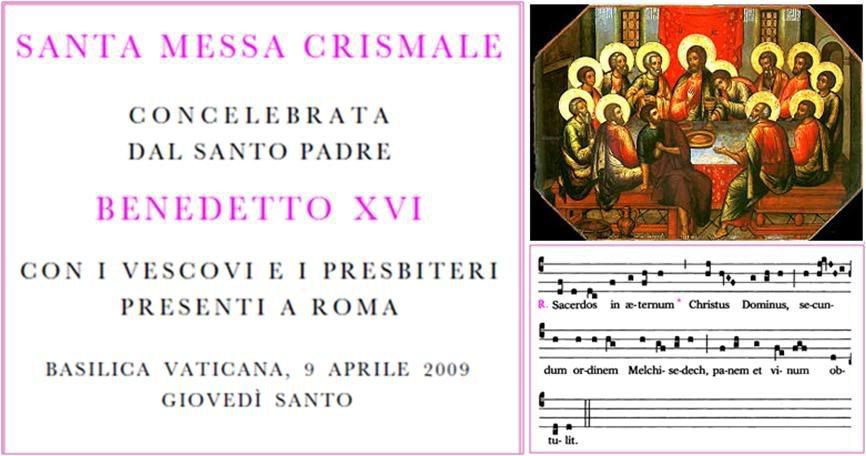
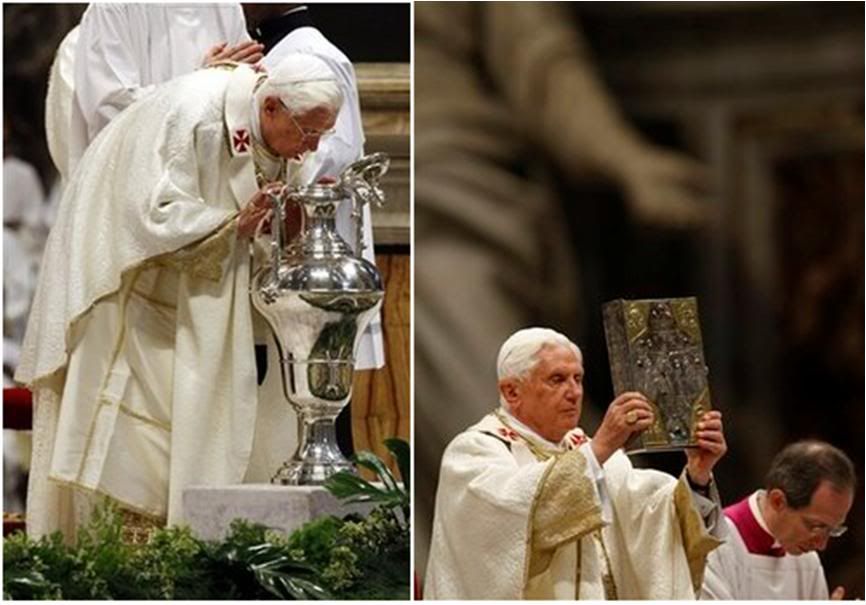
Dear Brothers and Sisters,
In the Upper Room, on the eve of his Passion, the Lord prayed for his disciples gathered about him. At the same time he looked ahead to the community of disciples of all centuries, “those who believe in me through their word” (Jn 17:20).
In his prayer for the disciples of all time, he saw us too, and he prayed for us. Let us listen to what he asks for the Twelve and for us gathered here:
“Sanctify them in the truth; your word is truth. As you sent me into the world, so I have sent them into the world. And for their sake I consecrate myself, so that they also may be consecrated in truth” (17:17ff.).
The Lord asks for our sanctification, sanctification in truth. And he sends us forth to carry on his own mission. But in this prayer there is one word which draws our attention, and appears difficult to understand.
Jesus says: “For their sake I consecrate myself”. What does this mean? Is Jesus not himself “the Holy One of God”, as Peter acknowledged at that decisive moment in Capharnaum (cf. Jn 6:69)? How can he now consecrate – sanctify – himself?
To understand this, we need first to clarify what the Bible means by the words “holy” and “consecrate – sanctify”. “Holy” – this word describes above all God’s own nature, his completely unique, divine, way of being, one which is his alone.
He alone is the true and authentic Holy One, in the original sense of the word. All other holiness derives from him, is a participation in his way of being.
He is purest Light, Truth and untainted Good. To consecrate something or someone means, therefore, to give that thing or person to God as his property, to take it out of the context of what is ours and to insert it in his milieu, so that it no longer belongs to our affairs, but is totally of God.
Consecration is thus a taking away from the world and a giving over to the living God. The thing or person no longer belongs to us, or even to itself, but is immersed in God.
Such a giving up of something in order to give it over to God, we also call a sacrifice: this thing will no longer be my property, but his property. In the Old Testament, the giving over of a person to God, his “sanctification”, is identified with priestly ordination, and this also defines the essence of the priesthood: it is a transfer of ownership, a being taken out of the world and given to God.
We can now see the two directions which belong to the process of sanctification-consecration. It is a departure from the milieux of worldly life – a “being set apart” for God.
But for this very reason it is not a segregation. Rather, being given over to God means being charged to represent others. The priest is removed from worldly bonds and given over to God, and precisely in this way, starting with God, he is available for others, for everyone.
When Jesus says: “I consecrate myself”, he makes himself both priest and victim. Bultmann was right to translate the phrase: “I consecrate myself” by “I sacrifice myself”.
Do we now see what happens when Jesus says: “I consecrate myself for them”? This is the priestly act by which Jesus – the Man Jesus, who is one with the Son of God – gives himself over to the Father for us.
It is the expression of the fact that he is both priest and victim. I consecrate myself – I sacrifice myself: this unfathomable word, which gives us a glimpse deep into the heart of Jesus Christ, should be the object of constantly renewed reflection. It contains the whole mystery of our redemption. It also contains the origins of the priesthood in the Church.
Only now can we fully understand the prayer which the Lord offered the Father for his disciples – for us. “Sanctify them in the truth”: this is the inclusion of the Apostles in the priesthood of Jesus Christ, the institution of his new priesthood for the community of the faithful of all times.
“Sanctify them in truth”: this is the true prayer of consecration for the Apostles. The Lord prays that God himself draw them towards him, into his holiness. He prays that God take them away from themselves to make them his own property, so that, starting from him, they can carry out the priestly ministry for the world.
This prayer of Jesus appears twice in slightly different forms. Both times we need to listen very carefully, in order to understand, even dimly the sublime reality that is about to be accomplished. “Sanctify them in the truth”.
Jesus adds: “Your word is truth”. The disciples are thus drawn deep within God by being immersed in the word of God. The word of God is, so to speak, the bath which purifies them, the creative power which transforms them into God’s own being.
So then, how do things stand in our own lives?
Are we truly pervaded by the word of God?
Is that word truly the nourishment we live by, even more than bread and the things of this world?
Do we really know that word? Do we love it?
Are we deeply engaged with this word to the point that it really leaves a mark on our lives and shapes our thinking?
Or is it rather the case that our thinking is constantly being shaped by all the things that others say and do?
Aren’t prevailing opinions the criterion by which we all too often measure ourselves?
Do we not perhaps remain, when all is said and done, mired in the superficiality in which people today are generally caught up?
Do we allow ourselves truly to be deeply purified by the word of God?
Friedrich Nietzsche scoffed at humility and obedience as the virtues of slaves, a source of repression. He replaced them with pride and man’s absolute freedom.
Of course there exist caricatures of a misguided humility and a mistaken submissiveness, which we do not want to imitate. But there also exists a destructive pride and a presumption which tear every community apart and result in violence.
Can we learn from Christ the correct humility which corresponds to the truth of our being, and the obedience which submits to truth, to the will of God?
“Sanctify them in the truth; your word is truth”: this word of inclusion in the priesthood lights up our lives and calls us to become ever anew disciples of that truth which is revealed in the word of God.
I believe that we can advance another step in the interpretation of these words. Did not Christ say of himself: “I am the truth” (cf. Jn 14:6)? Is he not himself the living Word of God, to which every other word refers?
Sanctify them in the truth – this means, then, in the deepest sense: make them one with me, Christ. Bind them to me. Draw them into me.
Indeed, when all is said and done, there is only one priest of the New Covenant, Jesus Christ himself. Consequently, the priesthood of the disciples can only be a participation in the priesthood of Jesus.
Our being priests is simply a new way of being united to Christ. In its substance, it has been bestowed on us for ever in the sacrament.
But this new seal imprinted upon our being can become for us a condemnation, if our lives do not develop by entering into the truth of the Sacrament.
The promises we renew today state in this regard that our will must be directed along this path: “Domino Iesu arctius coniungi et conformari, vobismetipsis abrenuntiantes”.
Being united to Christ calls for renunciation. It means not wanting to impose our own way and our own will, not desiring to become someone else, but abandoning ourselves to him, however and wherever he wants to use us.
As Saint Paul said: “It is no longer I who live, but Christ who lives in me” (Gal 2:20). In the words “I do”, spoken at our priestly ordination, we made this fundamental renunciation of our desire to be independent, “self-made”.
But day by day this great “yes” has to be lived out in the many little “yeses” and small sacrifices. This “yes” made up of tiny steps which together make up the great “yes”, can be lived out without bitterness and self-pity only if Christ is truly the center of our lives. If we enter into true closeness to him.
Then indeed we experience, amid sacrifices which can at first be painful, the growing joy of friendship with him, and all the small and sometimes great signs of his love, which he is constantly showing us.
“The one who loses himself, finds himself”. When we dare to lose ourselves for the Lord, we come to experience the truth of these words.
To be immersed in the Truth, in Christ – part of this process is prayer, in which we exercise our friendship with him and we come to know him: his way of being, of thinking, of acting.
Praying is a journey in personal communion with Christ, setting before him our daily life, our successes and failures, our struggles and our joys – in a word, it is to stand in front of him. But if this is not to become a form of self-contemplation, it is important that we constantly learn to pray by praying with the Church.
Celebrating the Eucharist means praying. We celebrate the Eucharist rightly if with our thoughts and our being we enter into the words which the Church sets before us. There we find the prayer of all generations, which accompany us along the way towards the Lord.
As priests, in the Eucharistic celebration we are those who by their prayer blaze a trail for the prayer of today’s Christians. If we are inwardly united to the words of prayer, if we let ourselves be guided and transformed by them, then the faithful will also enter into those words. And then all of us will become truly “one body, one spirit” in Christ.
To be immersed in God’s truth and thus in his holiness – for us this also means to acknowledge that the truth makes demands, to stand up, in matters great and small, to the lie which in so many different ways is present in the world; accepting the struggles associated with the truth, because its inmost joy is present within us.
Nor, when we talk about being sanctified in the truth, should we forget that in Jesus Christ truth and love are one. Being immersed in him means being immersed in his goodness, in true love.
True love does not come cheap, it can also prove quite costly. It resists evil in order to bring men true good. If we become one with Christ, we learn to recognize him precisely in the suffering, in the poor, in the little ones of this world; then we become people who serve, who recognize our brothers and sisters in him, and in them, we encounter him.
“Sanctify them in truth” – this is the first part of what Jesus says. But then he adds: “I consecrate myself, so that they also may be consecrated in truth” – that is, truly consecrated (Jn 17:19).
I think that this second part has a special meaning of its own. In the world’s religions there are many different ritual means of “sanctification”, of the consecration of a human person. Yet all these rites can remain something merely formal.
Christ asks for his disciples the true sanctification which transforms their being, their very selves; he asks that it not remain a ritual formality, but that it make them truly the “property” of the God of holiness.
We could even say that Christ prayed on behalf of us for that sacrament which touches us in the depths of our being. But he also prayed that this interior transformation might be translated day by day in our lives; that in our everyday routine and our concrete daily lives we might be truly pervaded by the light of God.
On the eve of my priestly ordination, fifty-eight years ago, I opened the Sacred Scripture, because I wanted to receive once more a word from the Lord for that day and for my future journey as a priest.
My gaze fell on this passage: “Sanctify them in the truth; your word is truth”. Then I realized: the Lord is speaking about me, and he is speaking to me. This very same thing will be accomplished tomorrow in me.
When all is said and done, we are not consecrated by rites, even though rites are necessary. The bath in which the Lord immerses us is himself – the Truth in person.
Priestly ordination means: being immersed in him, immersed in the Truth. I belong in a new way to him and thus to others, “that his Kingdom may come”.
Dear friends, in this hour of the renewal of promises, we want to pray to the Lord to make us men of truth, men of love, men of God. Let us implore him to draw us ever anew into himself, so that we may become truly priests of the New Covenant. Amen.
[Modificato da TERESA BENEDETTA 26/04/2009 19:32] |
|
|
|
|